#i was just frustrated about the way a lot of people portray jason and engage in this sort of rheoric that harms real people!!
Explore tagged Tumblr posts
Note
Do you know what's up with all the fanart and fics and stuff that show Jason super close and Brotherly with Damian/Tim/Cass/Steph? Because not to be a Dick Grayson biased guy, but it really does seem like some backwards level misogyny taking people who have complex and important relationships with dick (especially Damian??????????) And being like nahhhhhh Dicks just the fun older bro lol he can't and doesn't have complex relationships with these guys but Jason who lower class and was tragically murdered does :D the Jason and Tim stuff Especially because Tim fucking hates Jason in canon and yet every 4th batman related fanart that pops up is them being closer than close brothers and Dick just a background character. I do understand people have biases and fave characters, but at this point, it seems people are doing this just to push dick out the way or undermine his importance, literally backwards misogyny fridging dick (and Barbara and steph) so Jason and cass get to play house and have that hug they absolutely had in canon
so i think a lot of this comes from what i understand to be a huge influx of new fans to batfandom during the pandemic, most of whom were primarily interested in fanon depictions of the characters. they got into the bats through fanfic or wfa or tiktoks or whatever and while some people then got into comics, tv shows, etc from there, plenty stayed in the "fanon universe" corner of fandom.
jason is especially popular among these types of fans, which led to them making more fanworks of him that got more new fans interested in him, and so on. this is is fine! i'm glad people have their biases and their faves because i certainly do too, we need lots of people with different faves for a diverse ecosystem!
unfortunately a lot of the things they say they like about red hood jason (good big brother, protective of and respectful towards survivors and sex workers, caring, compassionate, engages with his community, wants to improve his city, fights openly with bruce but is capable of reconciling with him, etc) are literally just dick's traits given to jason for the sake of softening jason's very abrasive and antagonistic post-crisis character (and anything set in/around utrh is necessarily based in post-crisis!). even jason's relationships that they say they like, such as his n52+ friendships with roy or kory, are... dick's. and fans of roy or kory generally hate how they're portrayed in relation to jason because their characters have to be warped to force them into relationships with him.
and now that these fanon-focused fans have built a version of jason that they love which happens to overlap heavily with dick, they have to do something else with dick. which is usually, as you pointed out, assigning him a shallow personality or pushing him into the background of fanworks in some way. he has to be mindlessly supportive of daddy bruce, cheerful, ditzy, a crybaby, etc to simplify him out of his normal central role in the lives of characters like tim, damian, bruce, etc (it's interesting that he's often loaded with stereotypically Annoying Feminine Traits in comparison to jason being made a "strong but soft" masculine man... hm...).
the only mainstream comics canon that i'm aware of with meaningful basis for any other bats being closer to jason than to dick is n52, which has a really funny full page spread of tim going "wow.. i've never had a brother before... not like jason my beloved... <333" while laying next to jason on the ground. otherwise this whole "jason is the real big brother who all the bats love" thing is pure fanon.
now like. as to motivation for this. i think the vast majority of jason fans don't hate dick and don't have any ill intent towards his character or his fans. i feel you because as a dick obsessive i also get frustrated with all of this, but i seriously don't think most people who do this have any intent beyond having fun with their toys. and i don't think the fanon jason fans are really thinking about canon dick or jason to begin with for the most part--they're essentially playing with dolls shaped like the bat characters. and they're having fun with it so.... good for them *said through clenched teeth*
basically i think it all comes from a pretty harmless place but it's annoying as fuck and FEELS targeted lmao.
now, not speaking as a dick grayson superfan anymore--the shit that steph and cass get in particular to bend them into people who would looooove jason and embrace him as part of the batfamily is ABSURD. i can't imagine being a cass superfan in this society. as if CASSANDRA CAIN would give jason a hug and go "big brother <3" when jason has repeatedly desecrated the batsymbol (which is how cass would see it, as desecration!!!). jason had the option to not kill and he chose to kill because he wanted to. cass would beat his ass.
i am especiallyyyy peeved when i see "steph and jason would be besties because they're both from poor families :D" takes because like. first of all, weird to reduce them to "the poor robins." and very weird to try for a "both of their dads were villains/henchmen" angle too because red hood jason has killed plenty of criminals who left kids just like steph behind. second, steph would not tolerate post-crisis jason. jason tormented tim and then--EDIT: GANG I MISREMEMBERED THIS jason is not the one who shot damian in the spine. however i still firmly believe steph would beat his ass.
(i do personally think an element of misogyny/homophobia is involved in how readily people will strip dick of his personality and relationships and give them to the more traditionally masculine jason, who has no "questionable" relationships with men and whose relationship with bruce is "pure" and straightforwardly familial, but i don't have the spoons to put that into words rn. but i feel you. but it's also a complicated thing to talk about without sounding like i'm talking over misogyny towards actual female characters. you know)
#asks#i don't know anything about duke or anyone else introduced post-flashpoint btw so like. who knows if they're close to jason
45 notes
·
View notes
Note
hi, i hope anons are ok! i love a lot of what you’ve had to say abt jason, especially his relationship w/ vigilantism, and i was curious what opinions you might have on David Graeber’s article on superheroes (called Super Position)? hope it’s okay to ask, and sorry i don’t provide a link (<- does not know how to link things). also understand if you don’t want to give ur opinions considering this is a subject that ppl argue over all the time, i’d just be really interested in what you think
hello!!! anons are totally fine always. thanks so much for reaching out! & i’m sorry for the delay, i only check my inbox every so often.
i’m assuming you’re referencing this article! i had never read it before, so this was my first time being exposed to it and i subsequently don’t have a well-formulated take yet so much as some preliminary thoughts! i’ve gone ahead and bulleted them below. i’m also aware that, since this is an older piece, there may be a breadth of pre-existing discourse and academic discussion about this, in which i’m not yet well versed, so i invite anyone (especially my dc mutuals) to chime in or send me their own thoughts. okay. here goes!
i think graeber is correct to comment on how superhero media is often reacting to the current sociopolitical climate. it’s well documented that following 9/11, many superheroes were written as militarized in ways they had not been previously, and seeing that as accidental ignores the fact that everyone in the writers’ and editors’ rooms for these comics is influenced by the world in which they’re living and often respond to that world within their work. this can be intentional or accidental, and it’s not a binary thing, either — writers can seek to intentionally respond to a current issue (think of the after-school-special style comic books written in the 80s and 90s) and also replicate unconscious bias that they’ve internalized through their experiences in a white supremacist, cisnormative, ableist, heteropatriarchal society.
additionally, in some senses many comic books have always been reactionary. superman was created by two jewish men in response to the global rise of fascism and nazism and there were panels where he specifically took down hitler. superhero comic books depict worlds parallel to our own, with various kinds of inequality and injustice portrayed and philosophical questions posed that are similar to some of the ones we chew on in our day-to-day lives. it’s another medium enabling us to confront difficult situations and ideas from a safe distance.
i specifically roll my eyes at the use of freudian psychology as a legitimate basis for analysis, and i also acknowledge that freud’s “psychology” was far more based in literary analysis and criticism than it ever was in scientific engagement with the human mind, so i understand graeber’s use of it here. it just pisses me off which is my own thing to feel and deal with as someone who hates freud and heard too much about him in one of my english classes this past year.
a lot of graeber’s points about the creation of laws and morality were really really interesting. i think on their own some of them are very well worded. i think he slightly half-assed the transition to discussing comics again though, i’m not gonna lie.
i think graeber also missed a really good moment in analyzing the role of individual moral codes in superhero media. batman’s self-imposed code against killing, for example, is not solely put in place due to outside influences. it’s also something bruce believes in for better or for worse given that (when he’s written well) he’s a big believer in the ability of people to change and improve. what’s often unfortunate about batman is that he’s not consistently written to be aware of systemic factors that influence or destroy people’s abilities to truly be able to choose. a frequent critique of batman is that he beats up on people in poverty — while this is often frustrating to hear since, narratively speaking, bruce wayne is funding most of gotham’s social services himself, the point about bruce and his class divide is in some ways a valid one. this is why i find the fact that several members of the batfamily are working class to be so fascinating; if written well, there is a lot of potential for bruce’s weak points to be addressed and critiqued. alas. anyways back to the point. bruce imposes this code on others with a well-known inflexibility. yet he does follow it himself. many dc superheroes have similar personal code structures, and they do not usually consider themselves above them.
graeber describes superheroes to have a “parasitical” relationship with villains in the way that cops do with criminals. i have complicated feelings about this statement, partially because it displays an understanding of policing that i view as partially incomplete. systems of policing don’t just somewhat rely on crime to exist — they require crime, and if no such “crime” exists, they create it. modern policing exists to protect property and enable the status quo; the (capitalist) status quo requires inequity to exist, as well as a good/bad binary. even if the societal conditions that create most of what are considered crimes were properly addressed and people were cared for sufficiently, the existence of policing REQUIRES that some be subjugated and labeled illegal in order to justify its continuance. i think graeber understands this, and that he’s pointing to how superheroes need crime to fight, but the parasite imagery sort of ignores this requirement and the way that policing creates “crime”. a parasite flits from food source to food source, draining it until it’s dry. the police force creates more supposed crime to prey upon. that doesn’t feel like quite the same. but (back to superheroes) without villains, there isn’t a story that looks the same, i’ll give him that.
wrt graeber’s analysis of the nolan batman movies, i will admit that i haven’t seen any of those movies in actual ages. i don’t think i can respond to that analysis except to say that i think some narratives in all batman media are fundamentally flawed from a political standpoint and it doesn’t surprise me if those are replicated or furthered in some of the movie adaptations by other rich people who are out of touch w how the world works. lol.
also (and this has less to do with the article itself and more to do with what it made me think about) i think it’s important to acknowledge that the relationship most superheroes have with the policing and carceral systems is an inherently conservative one. the question of what should be done with those who have committed crimes is rarely interrogated beyond the handing off of the villain of the week to the cops, who supposedly are equivalent to justice. this false equivalency is partially because it is “easier” for writers to end the story there and restart the cyclical story than to actually reckon with the systems that they are imitating and recreating uncritically in their work. the relationship of the superhero and the cop is a cornerstone of the genre — in many cases, it is the cop who is seen as the legitimate face of justice, and the relationship between the two is an enabling one. examining the roots of the policing system requires a different story be told entirely and it is not a story i have seen in many comics as of yet.
i love graeber’s point about how anarchists are villainized. i think it’s incredibly true and that the way media affects our perceptions of our lived realities is hugely important w this. many people don’t understand anarchism because they’ve only seen representations of them that double as anti-anarchist propaganda and are repelled from the getgo.
i also really like where he talks about how constituent/collective power hasn’t been accurately represented in superhero universes. i think we’ve seen some (perhaps feeble) attempts since he wrote the article but that on the whole it holds up.
i hope this was at least an interesting response if not a thorough one! happy to revisit the piece further if you have specific parts you’d like me to look at/respond to or follow up questions about any of my thoughts. thanks for sharing the piece!
#hope this was what u were looking for !! kinda !!!#wes.txt#asks#superheroes#dc comics#super position#david graeber
0 notes
Note
it shouldnt be contriversal that u cant just murder people sdkfjhsadjksahf and yet- True you also can't go out and beat up criminals. All super hero comics are about the idealization of violence. Many are about the idealization of violence as a trauma response. Also revenge stories are a cornerstone of human art so even with all that being true it is still a useful, worthwhile, healthy, and helpful type of media. See for example the Count of Monte-Cristo.
Okay, I can see where you are coming from, but I hope this response helps you understand where I'm coming from as well. I will be mostly talking about preboot Jason here, because that contains most of the moments that bother me, and also I refuse to read anything written by Lobdell anymore.
Murder in the DCU is, in general, frowned upon. Like I understand where you are coming from with the whole suspension of disbelief bit, but while heroes and fighting villains are a part of the constructs of the universe, murder, really isn’t? The moral line of not killing is very much still present in dcu, especially for heroes, and in Gotham. Death is still a big deal, and most people don’t come back to life, and when a hero kills someone (or thinks they killed someone - like in the case of Black Lighting) it is very often a big deal.
I think Jason has a lot of interesting facets as a character, and things that people can engage with that are super interesting. He is a character who was a victim, and a hero, and remembered in a distorted way. And that hurts. But at the same time its not fair to put this on the batfam either; the mourning process is for the living, and you are not expecting them to come back to life! In addition, Jason took that pain and anger and hurt and killed a lot of people. I think we should be able to acknowledge that Jason is hurting a lot, and it is sympathetic that he is lashing out but it does not justify the actions he is taking. If have a different interpretation, all the more power to you! But unfortunately, canon does not really back up this interpretation, and by trying to make it canon, it lands in some pretty unfortunate implications.
In canon, Jason: - Is a drug lord - I have a lot of thoughts about this decision for Jason - especially with Robin!Jason being against drugs and his own mother dying from overdose, him profiting from the sale of drug is a little uncomfortable (upwards of 40% of all drugs trade ://). In addition, people act like Jason is some perfect drug lord, when in reality UTrH, Jason is never seen making rules against selling to addicts or anything. He does make rules against selling to kids, which, I guess if they just turned 18, or if an adult buys it and gives it to them that’s okay then? He also preforms CAPITAL PUNISHMENT on people who haven't committed much of a crime other than selling drugs to a 17 year old or whatever. - Blows up a school to prove a point (?) to a teenager - Kills like 81 people? to escape prison - Breaks into a tower to beat up a teenage hero - actually lets just make this one bullet point shoots and attempts to murder a lot of heroes, and like his actual family a bunch of times
I see this pattern in the fandom of defending these actions - Jason being a drug lord, Jason demonizing and murdering common criminals just because they committed a crime, and that makes me really unconformable. Its dehumanizing poor and marginalized people when you dismiss every henchman Jason murders without a second thought. They don’t deserve to die just because they made bad decisions, and especially in terms of drug dealers comes uncontrollably close to war on drugs propaganda.
Its a general feeling I have about putting antiheroes on a pedestal because they can "do what the hero can't" or whatever, without properly engaging with the text and realizing these actions are wrong.
I understand what you are saying about revenge stories, and if UrTH was about Jason killing just the Joker or people who hurt him, I could see your point more. But Jason hurts people totally unrelated to his revenge quest and he doesn't want to kill the joker; he wants Bruce to. Numerous times Jason can kill the Joker, he can stop him from killing, but he decides that his vengeance, him feeling avenged is more important. Jason will not kill the Joker; he wants Bruce to to do it, even though he knows it will hurt Bruce and so many others. He just wants absolution. He just wants to know he's loved, and he doesn't care who he hurts in the process. Its understandable! Its sympathetic! He's been through a lot. But at the end of the day, this isn't behavior that should be glorified and defended and justified. That's what I mean by it shouldn't be controversial that murder is bad. In count of Count of Monte Cristo, you aren’t supposed to think that Dantes blind revenge is good - there is a part in the book where he reflects and realizes that he’s hurt innocent people. And though he eventually goes forwards with his final revenge or whatever, there is an acknowledgement that he’s hurt people - innocent people (he ended up hurting his first love and her son Albert for instance). Jason never has that, in canon or otherwise, and a lot of people talk about him as if he has nothing to apologize for. In addition, Dantes only targets those responsible for his imprisonment, and they are taken down by their own vices which is what makes his revenge quest satifsying; Jason targets a lot of people that have nothing to do with his death. And this isn't to say you can't like him or that characters should never do bad things; Jason is a super interesting character to analyses and go in different directions for! Its just important to remember he isn’t a reliable narrator, and to not blindly justify murder. Anyways, I hope this initial dump of words helps you understand what I'm saying more? I'm in the process of writing a longer more comprehensive post on this topic for another ask, specifically what war on drugs rhetoric entails and its history, but that probably won't be out for a few months.
#asks#asked and answered#im really sorry if my inital tags were aggressive in any way#i was just frustrated about the way a lot of people portray jason and engage in this sort of rheoric that harms real people!!#dc comics#dc meta
220 notes
·
View notes
Note
Do you think Jason Todd fandom is kinda toxic? Because it seems like NO MATTER what DC do, there'll always be complains. Forget the bad adaptation like Titans. Even Judd Winick cannot escape the criticism with how he potrayed Robin!Jason. They just never satisfied.
SORRY, IT TOOK ME SO LONG TO RESPOND TO THIS. I just moved from Washington D.C. to Seattle, which, for my non-American friends, that's 4442km away. And I DROVE THERE ALL BY MYSELF. And now I'm trying to find new work in a new city and trying to stay mentally healthy and positive. Life is exciting but hard and scary.
*sighs*
As someone who was a fandom elder with V*ltr*n. I've seen some of the worst when it comes to fandom behavior. I'm talking people baking food with shaving razors and trying to give them to the showrunners. I'm talking leaking major plot details and refusing to take it down unless they make their ship canon (I am looking at you, Kl*nce stans) For the most part, DC Comics has had a decades-long reputation of treating their fans like trash and not caring what they think so from what I've seen, we all just grumble and complain in our corners of the internet about how we don't like how X comic portrays Jason Todd.
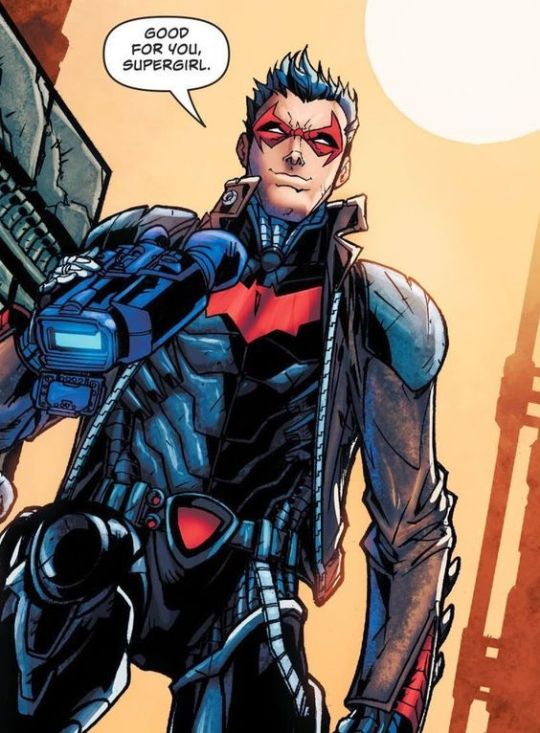
The challenge with Jason Todd is that he's your clinical anti-hero, the batfamily's Draco in Leather Pants, he's a jerkass woobie, and on top of all of that, he's a Tumblr sexyman. It's a perfect storm for a very fun but frustrating character to be a fan of. It doesn't help that every writer decides to re-invent the wheel every time Jason comes up so his canon lore is confusing at best and inconsistent as a standard.
I guess starting with a general brief on who Jason is and what is uniform about him with every instance he's appeared in comics/media.
Grew up in a poor family in Gotham with a dad who was a petty-mid-level criminal, and a mother who dies of a drug overdose.
Survives on the street on his own by committing petty crimes and potentially even engaging in sexual acts to keep himself alive.
Is cornered by Batman and taken in after Dick Grayson quits/is fired
Becomes the second Robin, but is known for being the harsher, more brutal Robin.
Is killed by Joker after being tortured, but somehow comes back to life and regains senses through the Lazarus Pit
Resolves himself to be better than Batman by basically being Batman but kills people.
Where there has been a lot of conflict in the fandom is the fact that Jason Todd is not a character that is written consistently. DC Comics loves to go with the narrative that Jason was "bad from the start" and was the "bad robin" when, yes, he has trouble controlling his anger, but he also still is just as invested in seeing the best of Gotham City and trying to be a positive change for the world as any other DC Comics hero.
Where I get frustrated with the fandom is its ability to knit-pick every detail of a comic they don't like while completely disregarding everything that makes the comics great and worth it to read. My example being Urban Legends. To which most people had pretty mixed reactions to. I was critical of the comic at first but as it went along I ended up really liking it. I have a feeling DC Comics went to Chip Zdarsky and told him he had 6 issues to bring Jason back into the Bat Family, and honestly he didn't do a bad job. Did it feel rushed? Absolutely. I wish there was more development of Jason and Bruce's characters and their dynamic as a whole. However, where I see a lot of people being angry and upset with Urban Legends is that they feel Zdarsky needlessly wrote Jason as an incompetent fool who needs Bruce to save him.
Whether or not that was the intention of Zdarsky is up to debate. However, and this may be controversial, but I don't think he wrote Jason Todd out of character at all. For as fearsome, intimidating, and awesome as Red Hood is. Jason is a character who is absolutely driven by his emotions. Why do you think he donned the role of Red Hood? As a response to his anger towards The Joker for killing him, and towards Bruce for not taking action against The Joker and for seemingly replacing him so quickly after he died. Jason didn't care about being the murderous Robin Hood or for being the bloody hammer of justice against N*zi's and P*d*ph*les. He only cared originally about making The Joker and Bruce pay. It wasn't until he trained under the best assassins in the world and realized most of them were horrific criminals who trafficked children and were p*dos that Talia began to realize that the teachers that she sent Jason to train under started dying horrific and painful deaths.
The entire story of the Cheer story in Batman Urban Legends was started because it finally forced some consequences upon Jason. Tyler, aka Blue Hood's father was a drug dealer who gave his supply to his wife and kids. And when Tyler's father admitted he gave the drugs to Tyler, it immediately made him fall within the self-imposed philosophical kill-list of Jason Todd. And Jason, well, he proceeds to kill Tyler's father. When this happens, Jason is in shock. Tyler's dad fit the bill to easily and justifiably be killed by Jason. We've never seen Jason having to deal with the consequences of being a murderous vigilante on a micro-level. When Jason realizes what he's done in that he's murdered Tyler's dad, he's shocked. He tells Babs the truth. He does a rational thing because he's in shock. He doesn't know what to do, he never has had to face the consequences of his actions as Red Hood and now the gravity of befriending a child as a vigilante hero who kills people just set in when he killed the father of the same child he was just introduced to.
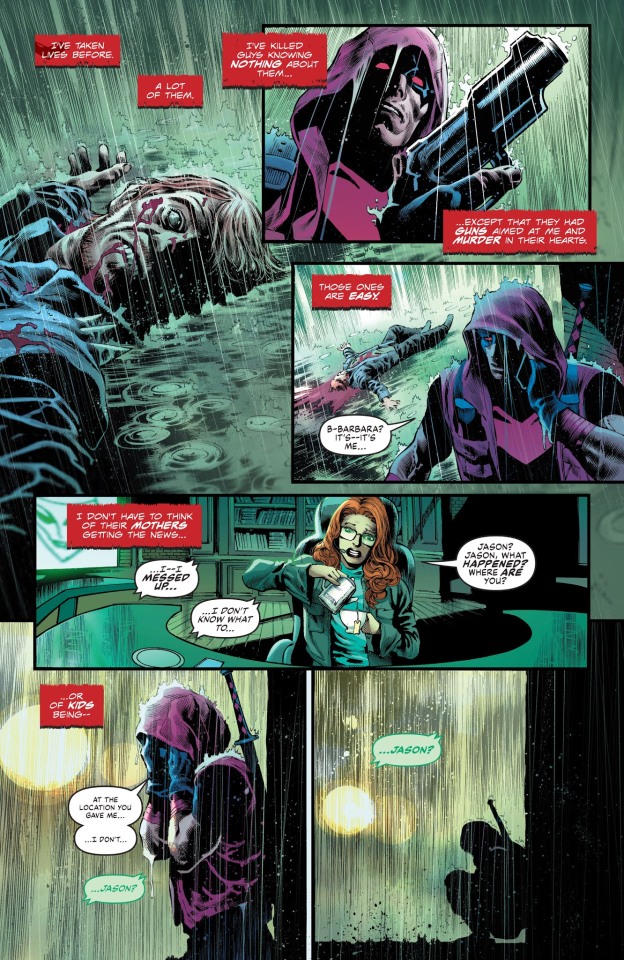
(Oh here's a little aside because it had to be said, Jason would not have been a good father or a good mentor to Tyler and absolutely should not have been his new Robin. Jason is a man who is in his early 20's (not saying men in their early 20's can't be good fathers at all) who is a brutal serial killer using the guise of a vigilante anti-hero to let him escape most of the law. the complications of having the man who murdered your father adopt you and make you his sidekick are way too numerous for me to explain in a long-winded already heavy Tumblr essay post. There's a reason why we don't advocate for a story where Joe Chill adopted Bruce Wayne or one where Tony Zucco took in Dick Grayson.)
The next biggest argument is that they feel that Jason is giving up his guns as a means to just be invited back into the Bat-Family. To which I will tell anyone who has that argument to go actually read Urban Legends. Already have and still have that argument? Please re-read it. Don't want to? That's okay, I will paste the images from the comic where Jason specifically says that he doesn't want to give up his weapons for Bruce and his real reasoning down below since the comic isn't exactly readily accessible.
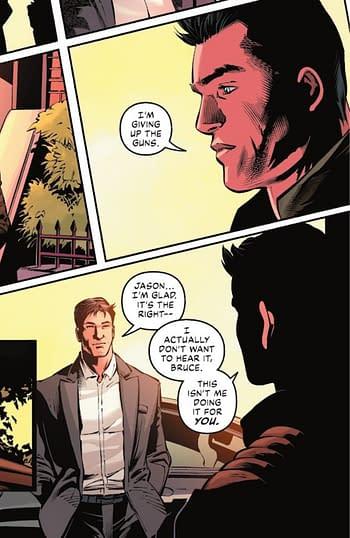
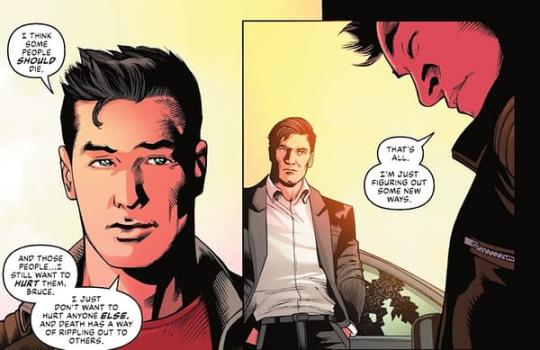
Jason gave up the guns because he felt the gravity of what he had done and knows how it'll effect Tyler. Thankfully his mom is alive and in recovery. But Tyler doesn't have a father anymore. And Jason killed Tyler's father. It may have been in accordance to Jason's philosophy, but it was a case where it blurred the lines. Jason Todd isn't a black and white character, just very dark gray. He doesn't kill aimlessly like the Joker. If you are on Jason's list you probably have done something pretty horrific, and also just in general, being in his way or being a threat to him. Mind you, in early days of Red Hood and the Outlaws (Image below) Jason almost killed 10 innocent civilians in a town in Colorado all because they saw him kill a monster. That being said, Jason isn't aimless in his kills.
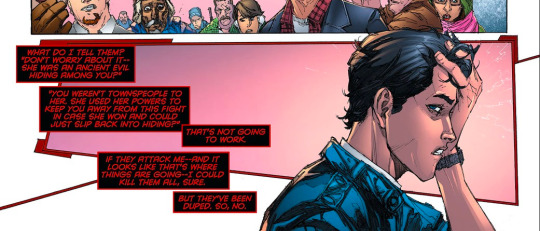
(Also can we just take a moment to appreciate Kenneth Rocafort's art? DC Comics said we need to rehabilitate Jason Todd's image and Kenneth Rocafort said hold my beer: It's so SO GOOD)
That being said, the key emphasis in the story of Cheer asides from trying to introduce Jason Todd back into the Bat Family and give an actual purpose for him being there, other than him just kind of being there ala Bowser every time he shows up for Go Kart racing, Tennis, Golf, Soccer, and the Olympic games when Mario invites him, is that Jason and Bruce ultimately both want the same thing. Jason wants to be welcomed back into the family and to be loved and appreciated. Bruce want's Jason back as his son and wants to love and protect Jason. Both of these visions are shown in the last chapter of Cheer while under the effect of the Cheer Gas. It's ultimately this love and appreciation they both have for each other that helps them overcome their challenge and win.
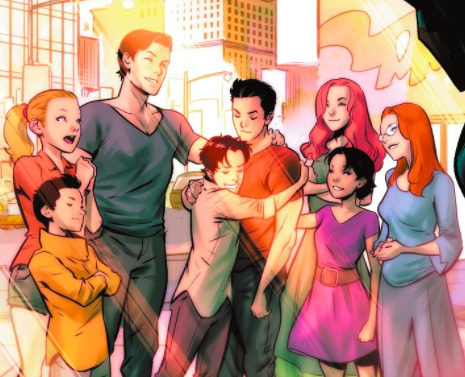

Jason Todd is a character who, just like Bruce, has been through so much pain and so much hate in his life. The two are meant to parallel each other. While Bruce chose to see the best in everyone, giving every rogue in his gallery the option to be helped and give them a second chance, hence why he never kills, Jason has a similar view on wanting to protect the public, but he understands that some crimes are so heinous they cannot be forgiven, or that some habitual criminals are due to stay habitual criminals, and need to be put down. But at the end of the day, the two of them both try to protect people in their own ways.
I am aware that through the writings of various DC Comics authors such as Scott Lobdell and Judd Winick, the two have had a very tumultuous relationship. And rightfully so, I am by no means saying that Scott Lobdell writing an arc where Bruce literally beats Jason to within an inch of his life in Red Hood and the Outlaws, nor Judd Winick's interpretation of Under the Red Hood where Bruce throws the Batarang at Jason's neck, slicing his throat and leaving him ambiguously for dead at the end of the comic is appropriate considering DC Comics seems to be trying everything they can to integrate Jason back into the family. That being said, a lot of these writings have shaped the narrative of Jason and Bruce's relationship and have an integral effect on the way the fandom views the two. It doesn't help that Zdarsky acknowledged Lobdell's life-beating of Jason by Bruce at the very end of Cheer by having Bruce give Jason his old outfit back as a means of mending the fence between the two of them. That does complicate a lot of things in terms of how they are viewed by the fandom and helps to cause an even greater divide between the two.
Regardless, I want to emphasize the fact that Jason Todd is a part of the family of his own accord. Yes, he's quite snarky and deadpan in almost every encounter. However, Jason is absolutely a part of the family and has been for a while of his own will. There's a great moment in Detective Comics that emphasizes this. Jason cares about his family because it is his found family. Yes, they may be warry about him and use him as a punching back and/or heckle him. At the end of the day, we're debating the family dynamics of a fictional playboy billionaire vigilante whose kleptomania took the form of adopting troubled children and turning them into vigilante heroes. Jason Todd wants a family that will love and support him. This is a key definition of his character at its most basic. This was proven during the events of Cheer and is being reenforced by DC Comics every time they get the opportunity to do so.

Now, none of this is to say that I hate Judd Winick. I do not, I don't like the fact that in all of his writings of Jason, he just writes him as a dangerous psychopath, and Winick himself admits to seeing Jason as nothing much more than a psychopath. Yet Winick is the one who the majority of the fandom clings to as the one true good writer of Jason Todd because 'Jason was competent, dangerous, smart' Listen, friends, Jason is all of that and I will never deny it. However, what I love about Jason isn't that he's dangerously smart of that writers either write him as angsty angry Tumblr sexyman bait or that they write him as an infantile man child with a gun. There's a large contention of this fandom that has an obsession with Jason Todd being this vigilante gunman who is hot and sexy and while I definitely get the appeal. It is very creepy and downright disturbing that all of you hyperfixate on his use of guns and ability to be a murderer. It is creepy and I'm not necessarily here for it.
What I love about Jason Todd is that despite all of the pain, all of the heartache, all of the betrayal, and bullying, and death, and anguish. Jason Todd is one of the most loving and supportive characters in all of DC Comics. Jason has been through so much in his life, but he still chooses to love. He still chooses to see the bright side in people. Yes, he takes a utilitarian approach and chooses to kill certain villains, but at the end of the day he wants to see a better world, and he wants to be loved. It takes so much courage and so much heart to learn to love again after one has been abused or traumatized. I would not blame Jason at all if he said fuck it and just went full solo and vigilante evil. He has every right to, but he still chooses to be with the Bat Family of his own accord. That's something that I see a lot of in myself. I have been through a lot of trauma and yet I try to be a better person myself in any way that I can. It is extremely admirable of Jason to allow love back into his heart when he really doesn't need to. He kills and he protects because he has this love of society. It may have been shaped by anger and hatred, but Jason has found his place amongst people who love him and value him. I think Ducra, from Red Hood and the Outlaws put it best in the image given below.

To end this tangent, I love Jason Todd and all of his sexy dangerousness, but it's far more than that. As much as Jason may be dangerous and snarky, he loves his family without a shadow of a doubt. I look up to Jason Todd because despite all of his pain and all of his trauma, he still choses to love. Jason Todd is a character who is someone I love because despite all of his flaws and having a very toxic fandom, he still serves as a character filled with so much heart and so much passion. I wish more writers would understand that. But for now I will live with what I have. Even though the fandom may be vocal about it's hatred for his characterization, I choose to love Jason regardless because he is a character who chooses love and acceptance regardless of his pain. Jason Todd is by no means a good person in any sense of the word. He has easily killed upwards of 100 people by now. He is a character who is flawed and complex but ultimately is one who powers forwards and finds love and heart in a place from so much pain and anguish. That is what I love about Jason Todd. After all, to quote a famous undead robot superhero, "What is grief, if not love persevering?" Jason Todd chooses to love despite all of the trauma and pain and grief. Yes, he is hardened in his exterior, but inside there is a man with a lot of love to give and someone who deserves the world in my eyes.
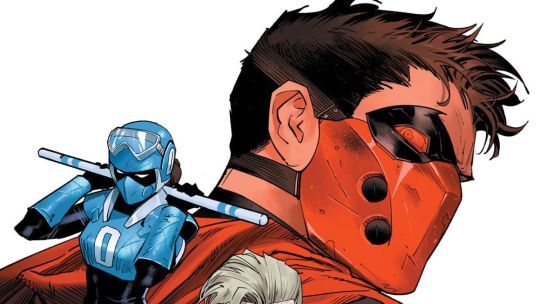
#Long post GOD#Jason Todd#Red Hood#Bat Family#Batman#red hood and the outlaws#RHATO#RH:O#Batman Urban Legends#Red Hood Lost Days#TW Voltron#TW Death#tw murder#TW Klance#Gotta love how i am pouring my heart out onto jason AND calling out the Voltron fandom#Regardless love Jason Todd people
146 notes
·
View notes
Note
So....have you read the latest Avengers #20, about the current version of She Hulk? How do you feel about that?
I’ve made a point of avoiding Jason Aaron’s Avengers because I truly can’t stand what he’s done to Jen. He took a character who, for all her more recent traumas, for all she can struggle to balance her legal career with her the pitfalls of being a publicly known superhero, loves who she is and embraces being green wholeheartedly -- he took Shulkie and turned her into Lady Bruce Banner, retiring lawyer whose inner ragemonster is just waiting to break loose. It’s some deep-seated bullshit and I’ve been trying my best to simply wait for it all to pass over.
But it was hard to ignore Avengers #20, because this was the issue where Jason Aaron went right off the fucking rails. I mean, he really went full Aaron Sorkin on his readers, and that isn’t a compliment.
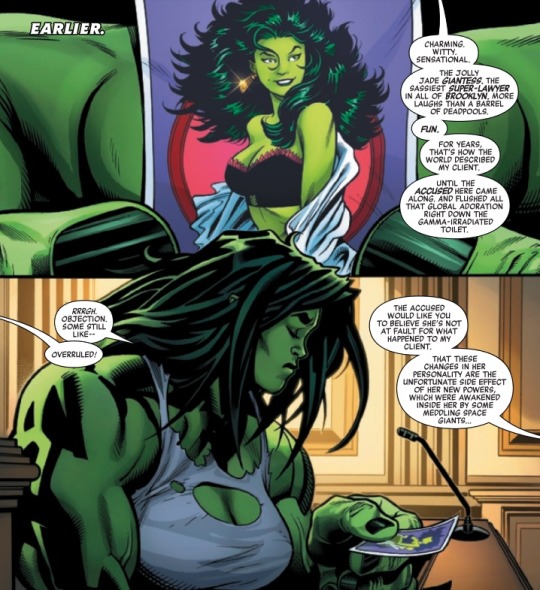
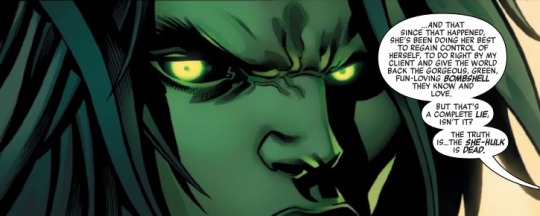
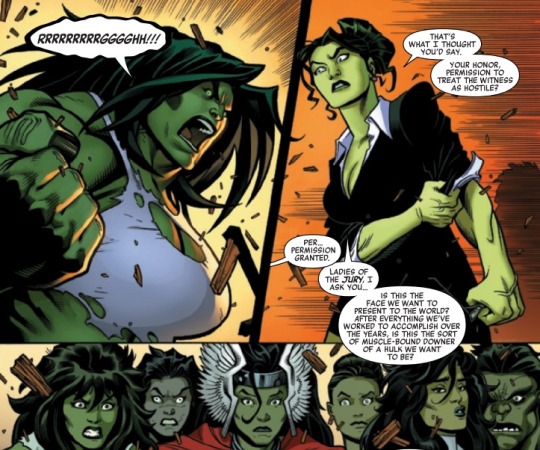
Classic She-Hulk: Charming. Witty. Sensational. The Jolly Jade Giantess. The sassiest super-lawyer in all of Brooklyn. More laughs than a barrel of Deadpools. Fun. For years, that’s how the world described my client. Until the accused came here and flushed all that global adoration down the gamma-irradiated toilet.Jason Aaron She-Hulk: Rrrgh. Objection. Some still like--Judge Jen: Overruled!Classic She-Hulk: The accused would like you to believe she’s not at fault for what happened to my client. That these changes in her personality are the unfortunate side-effect of her new powers, which were awakened inside her by some meddling space giants... and that since that happened she's been doing her best to regain control of herself. To do right by my client and give the world back the gorgeous, green, fun-loving bombshell they know and love. But that’s a complete lie, isn’t it? ... Ladies of the jury, I ask you... is this the face we want to present to the world? After everything we’ve worked to accomplish over the years, is this the sort of muscle-bound downer of a Hulk we want to be?
This sequence takes place in the context of a mental simulation being used by Jen in an effort to build her control over her powers, but in truth it’s just three long and excruciating pages of Aaron taking petty swipes at fans who are unhappy with his portrayal of She-Hulk. Through this exchange, he deliberately frames criticisms of his She-Hulk as shallow, over-the-top and sexist, suggesting that those of us who dislike his barely-recognisable ‘roidmonster Jen simply don’t understand good writing and that we just want a fun sexy green bombshell to wank over.
(Also implicit in this, and indeed throughout the comic, is the view that classic She-Hulk is less meaningful as a character because her comics are frequently humour-oriented. ‘Funny’ is situated in contrast to ‘deep’, ignoring the fact that Jen’s best writers have found room for both, and that Aaron’s She-Hulk fails to be either.)
And that sets the tone for the whole issue. From that point on, the entire comic is just Aaron transparently editorialising that no, you guys just don’t get it, my She-Hulk is better and deeper and more feminist than your She-Hulk.
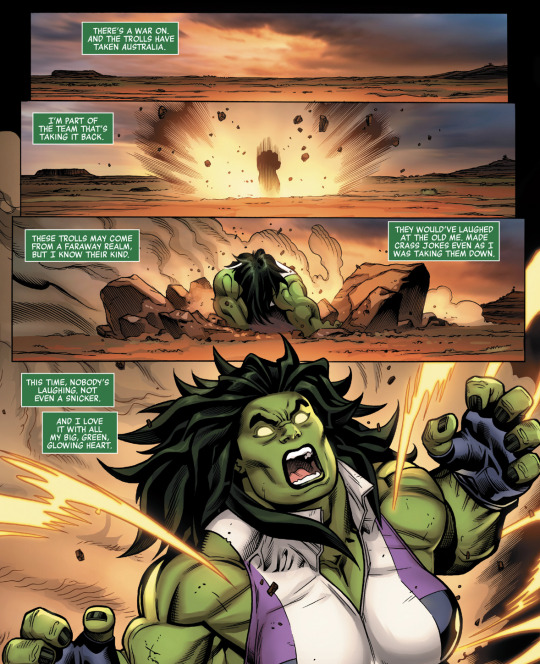
“I was an omega-level threat in the charm department. I was the Hulk you’d want to have a glass of pinot with. And the craziest part was, my powers, for the most part... made me happy. An incredibly rare occurrence in my line of work. I actually enjoyed being a hero. I loved being the fun Hulk. I loved it a whole helluva lot. So how come I don’t miss it?
“There’s a war on. And the trolls have taken Australia. I’m part of the team that’s taking it back. These trolls come from a faraway realm, but I know their kind. They would’ve laughed at the old me. Made crass jokes even as I was taking them down. This time, nobody’s laughing. And I love it with my all big, green, glowing heart.”
The frustrating thing is, he’s right on the cusp of something genuinely interesting here.
Men who speak angrily and aggressively are apt to be seen as tough, forceful and strong-willed; women who do the same are more often viewed as shrill, nagging, hysterical, bitchy. Many women consciously or unconsciously learn to mask their anger, make ourselves smaller and less threatening. Asserting yourself can be the difference between being seen as the ‘fun girl’ and the humourless bitch.
And the sexual harassment he references -- the sexist jokes, the propositioning, the devaluing of women’s capabilities -- not only are these things that many women, from the most disadvantaged to the most powerful, face to different degrees, they’re relevant on a meta level to the portrayal of women in comics.
All of these themes would be ripe for exploration in the context of classic She-Hulk. Jen is a fun-loving character whose life isn’t governed by rage and the need to control it the way other Hulks are, but that doesn’t mean she can always afford to lose her temper -- as both a woman working in a profession rife with sexism and ‘old boys club’ attitudes, and as a female superhero in the public eye, “you wouldn’t like me when I’m angry” takes on a whole different meaning.
Conversely, we might also think about Jen’s privilege in this regard -- that by virtue of her public profile and influence and general ability to grind men into a pulp without breaking a sweat, she doesn’t face the same level of discrimination as other women. That other women (particularly women of colour and LGBTQI women) don’t have the same freedom to express their anger as she does, not without consequences. And that -- as both the superhero She-Hulk and as the high-profile lawyer Jennifer Walters -- she is in a position to help other women to be heard and ensure that their anger is answered with change.
As for historical sexism in comics, there’s no better antidote to the male gaze than hiring more women and nonbinary people.
None of that seems to interest Jason Aaron. Rather, in defence of his roided-out Girl Bruce, he seems to be saying... what? ‘I have fixed sexism by making Jen so buff that men are too scared to undervalue or sexually harass her’?
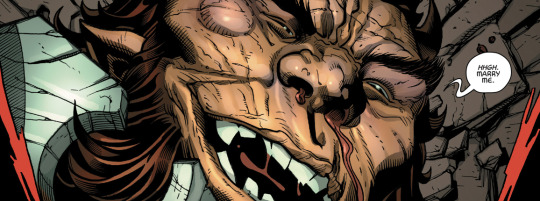
(Which, by the way, they still do anyway.)
Next, we get this exchange:
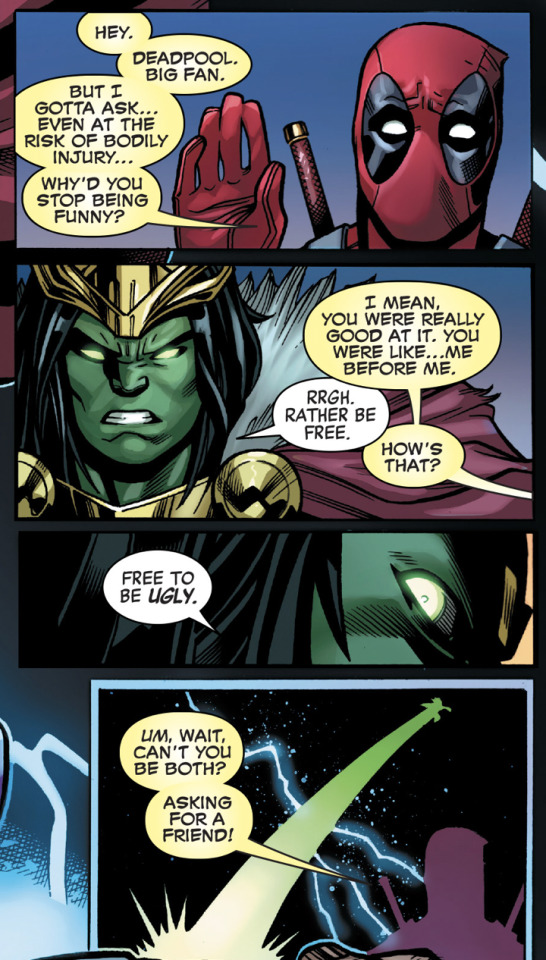
Deadpool: Why’d you stop being funny? I mean, you were really good at it. You were like... me before me.She-Hulk: Rrgh. Rather be free.Deadpool: How’s that?She-Hulk: Free to be ugly.Deadpool: Um, wait, can’t you be both?
So, the implication is that before now, Jen wasn’t “free” to be her whole self -- that she had to be the fun, funny girl to avoid being seen as too angry and threatening.
And aside from the fact that, as I said, I think there are many more nuanced ways to explore this without negating Jen’s characterisation -- this is just lazy goddamn writing. It’s not an idea Aaron has explored up till now, nor is it reflective of the ways in which Jen has been portrayed in the past. It’s just a messy retcon jammed into the story to justify the ‘superiority’ of Aaron’s version of the character. Once again, the writer is speaking through the characters.
We also see Aaron once again implying that being “ugly” -- by which he means physically imposing, buff, not resembling a typical comic book pinup girl -- ‘frees’ Jen from the constraints of sexism, which is full-blown outrageous.
You think that men only sexually harass women they deem attractive? Really? You think that sexism stops at catcalls and underestimation? You think that Jen, a female superhero in the public eye, isn’t going to be subjected to ugly sexist slurs no matter what she looks like? That is as insulting as it is naive.
Later, Aarons-via-Jen engages in some meta-criticism of the fact that She-Hulk has traditionally been portrayed not as a huge, buff ragemonster but as a sexy bodybuilder (and retconning in a shit-ton of sexual harassment while he’s at it, because remember, sexism only affects women society deems conventionally attractive).

“Cousin Bruce said something once, a few years back... about how envious he was of me. How easy he figured I had it. When he hulked out, he became a giant, deformed monster who couldn’t even wear normal clothes. While there I was looking like a bodybuilder who’d just been spray-painted green. I could wear suits, walk down the street without people running and screaming. Teenage boys hung posters of me on their walls. Must be nice, Bruce said to me, to be that kind Hulk.
“I’d never wanted to punch my cousin so bad. And that’s saying something. I told him about the parts of being me that he was oblivious to. About all the times I’d been hit on during team-ups. The bad guys who’d cop a feel when we were fighting. The sleaze ball who published photos of me topless when I was in the Fantastic freaking Four. (I’d really rather you didn’t Google that.) No paparazzi ever followed Bruce around taking photos of his butt while he was fighting the Leader. I told him... looking like a big scary monster didn’t seem so bad to be sometimes.”
And here we really get to the thesis underlying Aaron’s argument, the reason he feels She-Hulk needed a complete overhaul.
Like most superheroines, She-Hulk was shaped by the male gaze. It’s fair to say that played a lot into her original character design as a green Amazonian bombshell, whose appearance and comparative level-headedness stood in stark contrast to the huge, monstrous, rage-driven Hulk whose powers she inherited. Heroines in cape comics are supposed to be ‘fun’ and ‘sexy’ (as judged by the men they were typically being written by and for). Jen’s body has frequently been the subject of titillation and her promiscuity has frequently been the subject of crude humour.
Aaron seems to view this as the flaw at the heart of the character, and it’s something he’s set out to correct -- by making her the gigantic, buff, scary, angry Hulk she was never allowed to be at the outset. Sexism thwarted! Strong Female Character accomplished! Give yourself a pat on the back, Jason.
Except, here’s the thing.
It’s true that Jen has often been depicted through the lens of a male sex fantasy.
It’s also true that many readers have embraced her as a female power fantasy.
As the super-buff, super-strong, seven-foot-tall She-Hulk, Jen doesn’t feel the need to bite her tongue or moderate her opinions or diminish herself out of concern for how others might respond. She doesn’t have to hide her confidence or her sexuality. Through her transformation, Jen gains the freedom to embrace all that she’s been repressing -- the brilliant, witty, brash, assertive, body-confident parts of herself she’s always kept hidden from the world.
In looking at Jen selectively through the lens of sexualised artwork, instances of bad writing and a frankly snobbish undervaluing of humour comics, Aaron zooms right past everything that makes her such an appealing and empowering character to so many readers.
Which brings me right back to Deadpool’s comment earlier in the issue: Can’t you be both?
If your complaint is that Jen is portrayed in a male-gazey, overly sexualised manner that de-emphasises her strength and physical power, hire an artist who will draw her as the buff, badass giantess that she is.
She-Hulk doesn’t need a gamma power-up or a brutish alter ego to be formidable, she’s She-Hulk ffs. And stripping Jen of all her femininity in the process of turning her into a ‘roided-out tank raises some dodgy gendered assumptions in itself.
(For me, Peak Jen is a giant buff green woman in a bright pink designer suit. Not only can she be both, she already was.)
And hey, just gonna throw this one out there again, if your complaint is that since her creation Jen has been predominantly written and drawn from male perspectives for a male audience, resulting in some sexist and oversexualised portrayals, how about you hire some goddamn women and nonbinary people to write and draw her?
This is not the Great Feminist Reimagining of She-Hulk that you think it is, Jason Aaron. This is a slightly more pretentious rehash of that time David Goyer dismissed the character as a “giant green porn star”. You’re trying to ‘fix’ Jen by negating everything that she was previously, which is quite simply bad writing.
And when you find yourself dedicating a full issue of a comic book to calling your readers stupid for not liking your treatment of a character, that feels like a pretty sure sign that you’ve fucked up.
85 notes
·
View notes
Text
Red vs Blue Season 17 Review, Part One
On March 9th, 2019, Red vs Blue: Singularity premiered at last. After the monster cliffhanger of S16, to say that many of us had been anxious would be an understatement. Well, it’s several months later and the season has concluded it’s 12 episode run. So, was it good? Was it bad? Well… that’s a hard question to answer. But however we feel, we’re going to be going over it today in my Season 17 Review~!
This baby got a Hell of a lot longer than intended, so hopefully, it’s coherent. I tried to be firm, but honest. No matter what I think though, there is no arguing that these people put in a lot of work to make this season a reality. I never want that fact to be ignored. So thank you Jason, Miles, Josh, Austin, Greg, Joe, RT Animation, and everyone else for all the hard work. Couldn’t have been easy, but we appreciate it all the same~!
So with that said, for the final time, let us talk about Red vs Blue Season 17.
Visuals/Machinima
This season was unique in that not only was Halo 5 still being us, but they had to go back and use all the past renditions as well. It looked like they were going to use Halo 2 Anniversary for the paradox stuff, a familiar yet different design, but I guess someone decided it was better to just reuse the older games. Which I think was probably the right choice. Halo 2 Anniversary I think would have helped add this feeling of everything being off, but at the same time seeing the previous versions helps connect to the moments more. It adds more emotional investment since we’re seeing something that we recognize being fucked with. It meant more work for the Machinima team, and I hope that they’re all still alive and had a nice vacation after it was all over cause yikes. Their efforts are greatly appreciated~
The machinima was overall very good. Josh Ornelas has been with the show for six years as a machinimator and directed at least a few episodes of S14. So he was more than fit to be a co-director for this season. Austin Clark is newer and IDK when he started (my guess is around 14 or 15), but I think he’s shown that he’s perfectly capable both as a machinimator and as a director. I never noticed any issues with the machinima that threw me off… but as usual, it’s hard to critique what are essentially video game movements/defaults. Very least whenever the characters were emotional or something, I got the feeling from how the scene was framed. Even though you can’t see the faces, the machinimators know how to frame it to make you feel the intended emotion. Episode 9 with Carolina and Wash’s talk I think demonstrated that. Yeah, the VA-ing helped, but you can see the emotion, even though there’s no emotion to display. And while Austin handled the even-numbered episodes and Josh the odd ones, everything felt like they were on the same page, which is essential when co-directing. They both did an excellent job directing.
Animation was sadly sparse compared to the last season. Wasn’t bad though. There were some good bits, like the opening credits and Wash directing his gun at Genkins in Episode 3. Oh. and Genkins getting stabbed with his own golf club was pretty gruesome, especially with his writhing around, but seeing the original Halo animated was nice. We only got one fight scene, but it was Carolina vs Carolina and it was badass. Not as creative as the Donut vs O’Malley fight, but still really good and impactful. Loved it!. The sets and effects were all very good. Just look at the opening. The effects used for The Everwhen looked really cool and other-worldly. The Labyrinth looked pretty creepy, as it should be considering its true nature. And of course, all the previous Halo’s still looked good… maybe a little dated with Halo: CE but still as good as it did in the remaster.
Overall, visually speaking, the season was really good. The machinima looked great and was directed competently. I felt engaged, and that’s what’s important. Definitely one of the season high points.
Voice Acting/Music
We’re mainly going to be discussing Dan Godwin, Shannon McCormick, Jen Brown, Ricco Fajardo, and Lee Eddy. Everyone else in the main cast was pretty much at the expected level of quality. There’s sadly not much to talk about specifically, which we’ll go more into during the character section. But Joel, Matt, Gus, Geoff, Becca, and Jason Saldana all did well and gave the quality that I expect from them, just nothing that stands out really. I’ll say this, Geoff and Becca’s performance in the finale was very strong and emotional and I loved it. Matt he both got to do Wyoming again and had to do Doc and O’Malley at the same time, which he nailed perfectly. And hearing Burnie as Church again was really nice… but never let him do English Lopez again. Ever.
Let's talk about villains first. Ricco Fajardo as Genkins is freakin’ fantastic. While we got glimpses of it last season, Genkins fun but truly shitty self is on full display this season. And Ricco is clearly having the time of his life recording it. He’s just always so cheerful and having fun, but it feels so messed up and sadistic due to the circumstances. But he owns it. Sometimes having a villain who is just shitty can be fun, especially if you have a competent actor doing it. And Ricco absolutely nailed it. We also have Lee Eddy, who voiced 479er, make her return to RvB as Chrovos. She too is clearly having a fun time. She goes full-on Large Ham with Chrovos’ theatrics and basting but also portrays her getting fed up very well. It’s the Gwen in her showing, haha. But yeah, these are two fun villain characters, and the performances very much reflected that. Loved it~
Next, we have our Freelancers, Shannon and Jen. They both got the emotions hard this season. Which considering how their plot ended last season, is no surprise. It’s no shock that these two did very well, but… man… Jen had to express a lot of guilt, but also a lot of tears and pain. Which she did very well. Carolina feels terrible and has to accept that her efforts were in vain, and Jen conveyed that very well. The second that Carolina breaks down in Episode 9… God, I just wanted to hug her. Then there’s Episode 11 where Carolina is confronting her past self, and it truly does feel like two different characters, even though it’s the same actress. It was a very strong performance this season, arguably her best one yet.
Then we have Shannon. Oh golly, Shannon. How long has he been doing Wash now? Over a decade, right? He knows this character in and out… and he perfectly shows that this season. Wash has a lot to get through this season. His anger at Carolina, him having to accept what happened, accept what has to happen, it’s a lot. Shannon nails it. From going back and forth between normal and crazy in Episode 3 to any time his anger at Carolina showed, to his talk with Carolina in Episode 5, his acceptance of his fate and prepping for it in Episode 9, and his horror to seeing everyone die in 11. And he still got lighter moments, like his interactions with Donut, which were super enjoyable. Shannon just knocked it out of the park this season, and I loved it.
But of course, the one I have to give the biggest kudos to is Dan Godwin. While he has performed Donut since the very beginning… well, he only got to do so much since Donut only got to do so much. He never did a bad job, or he was on par with everyone else, but he simply wasn’t really allowed to go beyond ‘optimistic, innuendo-spouting moron’. That is, until now. Dan got to do so much this season. He got a full range to do with Donut that he really never got, or only got so briefly. He got to be emotional, he got to be angry, he got to be frustrated, he got to be utterly done with absolutely everything. And he conveyed all of that very well. Heck, I think the pitch even lowered a little bit compared to before, or it felt less squeaky as the season went on. It feels more like an in-between of Blood Gulch Donut and pre-Paradox Donut, which I think works. Overall, Dan got to show how much experience with the character he really has after so many years of not getting to, and he was by far the best performer due to it.
Everyone in the cast did great. Even for brief returns like Miles and Gray with the Mercs, Arryn Zech with Dr. Grey, and the Freelancers all did a great job. Jason Weight as Grif’s coach was also simultaneously hilarious and scary. He clearly put his all into it, anyways. As for the music… what? Ae we surprised that it was good? David Levy and Trocadero again delivered a solid soundtrack. The fact that we have to wait for both this soundtrack and still for the S16 soundtrack continues to upset me. But at least it means a lot of quality tracks whenever they do come out. Solid job overall from the music team.
Characters
So one of the problems with these reviews is I have to remember to look at things two ways: as a fan and as a critic. We had a lot of really good character stuff with some characters… and not so much with others. And looking at it as a fan and then as a critic causes two widely different perspectives regarding this section. Normally I’d rather get the negative out of the way, but to explain the negative I have to talk about the positives first. Hopefully, I don’t come off as too harsh, but I want to be honest in this review as well. So.. here we go.
Okay, happy first. The two main focuses of this season are Donut and Wash. Let's do Wash, and in turn Carolina, first. Wash… well, got put to the side last season for the most part. His plot was mainly focused on his brain damage that he didn’t know about and ended with his blow up at Carolina. Which we all know what that leads to. Here, Wash has to deal with the fallout of it. He gets to stabilize and be back to pre-brain damage and is determined to save the others… but his anger at Carolina is lingering. His arc this season is about him forgiving Carolina, helping Donut, and accepting his own fate. I think, overall, Wash had a very good arc. And this is coming from someone who is not that big of a Wash fan.
Wash’s anger at Carolina is understandable, but he realizes that she did it out of concern for him and never meant to hurt him, and especially after talking to her in Episode 5 and how even when paradox’d she still trusts him, he forgives her. Carolina, in turn, has to deal with the immense guilt of her actions… again. Yeah, the fact that we got another ‘Carolina is guilty’ story after Freelancer, S13, and S15, it’s feeling a little repetitive. But her emotions regarding it were very well written. You do really feel the remorse and understand why she did what she did. It makes it even worse when in Episode 9, Wash accepts what has to happen and Carolina has to accept it. It was one of the toughest scenes in the season but was such a beautiful, poignant moment for both. They still have problems, like Wash fears of losing everyone and Carolina has past issues lingering still over Freelancer and her family. But it’s safe to say that they’ve both become closer and stronger.
The biggest character of this season is, of course, Donut. This was a long time coming. Up until the end of the last season, Donut was probably the most underutilized character in the show aside from maybe Lopez and Doc. He went from a dumb but semi-competent rookie to a flamboyant, one-note joke character. Like after Blood Gulch I can't think of anything significant that he contributed. Recollection more or less wrote him out/killed him off, Chorus did nothing with him, and S15 also did nothing with him and even forgot him in certain scenes. S16 began to fix that, having Donut get annoyed at being ignored, nearly betray everyone, and then get into one of the shows best fight scenes by far. So we were building up for something for this season, and sure enough, it came and it came hard… was that at innuendo? Dang it Donut, you’ve influenced me too much!
This was developed for Donut that was loooong overdue. He further got frustrated with being ignored and belittled by everyone around him. He recognized his innuendo problem and tried to actively improve it. He showed some of that competence he had in Blood Gulch, piecing things together and actively taking charge since he understood things the most. When he told everyone off in Episode 7, it felt so satisfying because of how long he’s been treated like a nuisance when he was at worst a little annoying and TMI. He was willing, tried his best, and it really felt like he was finally allowed to be more than just a joke. It really made me like and appreciate Donut a LOT more than I did before. Like he used to not just be my least favorite Red, but my least favorite of the BGC. Now? He’s right below Grif and Simmons on the Overall Favorites List. Yeah, that’s a LOT of places.
Donut was great and I wouldn't change him getting him this development… but this development did come at a cost. That being development for everyone else. The other Reds and the Blues were shafted and shafted pretty badly. The first half of the season, they are trapped with no memory and go about how they would in that time period. Which okay, it’s necessary for the plot so we can overlook that one. They get restored in Episode 6… and they are STILL badly shafted. They are all joke characters, which does NOT work when we’re this deep in the plot. I mean we get some moments, like Tucker reliving his failure on Crash Site Bravo and recognizing his fault over the past few seasons, Sarge has his scenario in Episode 11 that I thought was very insightful, but those are small moments. Sadly, Donut got too much attention. Even with Wash, him realizing how he was the Donut of Freelancer was more or less contributing to making Donut look good, as did Tucker’s moment. I like those scenes and I love Donut… but not everything had to be about him. He’s the main character, not the only one.
Let's do the Blues first. As I said, there were more or less just there and had no real major character development or effect on the plot. But that being said, they were given some legit good stuff. Tucker got it the best as he re-lived Crash Site Bravo and finally realized true leadership was. It was about stepping up when no one else would and when things were at their bleakest, not being the cool, macho guy like he kept acting like it was. Which after these past two seasons, was nice to see. I was one of the people who were perfectly fine with how Tucker was written the past two seasons because I could see why he had regressed. But I do know that a lot of people didn’t like it, and this feels like a good way to bring it all around. Have Tucker relive his worst moment, this time having to let it go through, and therefore truly remember what caused him to step up on Chorus: because he had to. It’s short, but it does its job and this along with his Labyrinth vision I think has really helped Tucker’s character immensely.
Caboose is overall pretty minor but had some good scenes like beating the shit out of Genkins in Episode 6 and figuring out how time travel worked before the others. It helps show that he’s an idiot, but he’s a smart idiot (if that makes any sense) and was a step up from his limited screentime last season. He also had my favorite line in the entire season (“These graphics look horrible!”). Sister was overall minor, but I’ll go into her later. You’ll see why when I get there. Doc was overall also minor and how the Hell he was in the Everwhen I’ll never know, but I do like him in the finale and finally getting a grip on O’Malley. He more or less is a combo of the two now and seems much more capable due to it, so that’s good. So yeah, while it may not have been a lot, the Blues and Doc were at least given something, which is better than nothing at all.
The Reds though… so you know how these past two seasons started giving them more development? You would think that since Donut is the main character, that would continue, right? Haha… nope! They went right back to ‘the comedy relief team who do absolutely nothing!’! Which after the past two seasons started to do more with them… yeah, this felt like a slap in the face. Sarge annoyed me this season. Mainly in Episode 7 where he was a hypocritical asshole about Donut’s betrayal, ignoring how he not that long ago betrayed everyone and was still feeling guilty about it. He was also the one primarily being a jerk to Donut, which did not do him any favors. I know it’s Sarge and he’s an asshole, so it’s not 100% unexpected… but I felt like it was pushed too much just to contribute to the ‘Donut is so unappreciated!’ arc. His speech in Episode 6 was hilarious though and I did like his Labyrinth vision showing that he can't handle both civilian or army life. It was surprisingly insightful in a way that I’m not used to with Sarge. So yeah, I feel his screentime was on par with Sister and Caboose at least.
Simmons… got nothing. Absolutely nothing. I mean the running gag where he kept seeing Donut shot was really funny, and it also meant he wasn't an asshole like Sarge. Heck, he seemed to be the only one willing to hear Donut out about saving them in Episode 7. And he did more or less point out how they could launch the gold club through the portal to stop Genkind from reigniting the paradox, which was minor but nice to see for him. Him not being a kissass anymore is also sticking, which seeing him back when he was pettier in Episode 2 did make me appreciate where he is now. The way that he was legit concerned for Donut during the ‘Wash shoots Donut’ gag also helps make it look like he at least cared about him in contrast to Sarge’s jackassery. But he was otherwise just there. Very least, it also means he was the only Red that I didn’t get frustrated about since his character remained consistent… until the finale with the utter bullshit that was his nightmare. Seriously guys, what the fuck?!
But at least with Sarge and Simmons, they weren’t exactly in the spotlight last season, so I don’t feel like I got cheated with them. I cannot say the same about Grif, however. Which we will cover that, as well as the Story section, in Part Two.
(Part Two)
11 notes
·
View notes
Text
Epic Movie (Re)Watch #189 - Spy
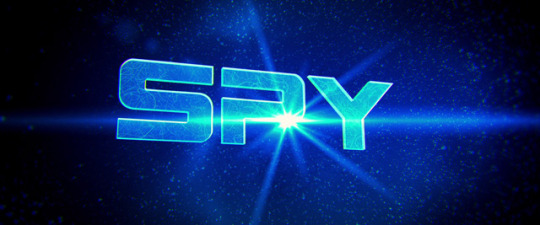
Spoilers Below
Have I seen it before: Yes
Did I like it then: Yes.
Do I remember it: Yes.
Did I see it in theaters: Yes.
Was it a movie I saw since August 22nd, 2009: Yes. #358
Format: Blu-ray
1) So the movie starts by introducing us to a sort of typical white guy spy. A James Bond type, but without the British accent (for some reason). It starts with the familiar, the usual tropes, before really fucking them over when Jude Law (who for some reason is trying to do an American accent and he’s not doing it well) sneezes and accidentally kills a guy.
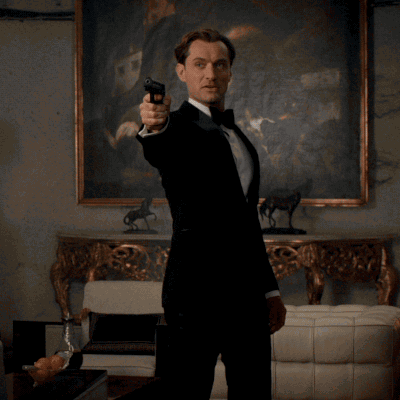
Which is an excellent joke to introduce is into the film’s wonderfully strong sense of humor. If you think you know how a trope is going to play out, you’re probably wrong. In fact, the entire opening sequence is a strong representative of how the film blends quality action with quality humor which will be consistent throughout the film.
2) Melissa McCarthy as Susan Cooper.

McCarthy is the foundation on which the rest of the film is built. From the very first minute we spend with her character she is established as not only good at her job but incredible at it. It is easy in spy spoofs for the main spy to be a bumbling idiot, but Susan’s continued competence is in fact one of the key factors which makes this film as incredible as it is. Especially considering the fact she does have some insecurities at the beginning, insecurities which are largely unfounded because she is fucking good at her job. McCarthy is able to have incredible warmth, heart, and vulnerability as Susan which she doesn’t always show in her film roles. But also when the script calls for it she can have this amazing brashness and humorous loudmouth/angry quality. Susan goes through an incredible transformation from the moment we meet her to the moment we leave her and McCarthy is able to play that absolutely perfectly. It’s HER story, it’s HER movie, and we are just along for the ride in an amazing way.
3) “Who Else Can You Trust?” is abbreviated in the film’s opening credits (I own the full version found on the album) but feels like a real Bond song with the opening credits feeling like a real Bond opening credits. This is part of the reason Spy is able to differentiate itself from other spy comedies like Austin Powers. It takes the genre, action, and stakes seriously throughout. This is real danger and true villains who are trying to get their hands on a nuke. It’s not like “oh, it’s funny because the spy is stupid and the bad guy’s want to kill all cats” or something like that. This sort of silly comedies can and have worked in the past, but Spy’s comedy is born out of its strong sense of characters and performances from the actor. Not by making fun of the genre, but embracing it in a wonderfully fun and funny way.
4) Jude Law’s Bradley Fine often times steps over the line which divides nice guy from Nice Guy™.
Susan: “Could you imagine me as a spy?”
[Fine, who has seen how badass she was in training, laughs at the idea.]
He’s an idiot and kind of a jackass. He may not actively be trying to belittle her but that’s what he does in pretty much 99% of their conversations. He’ll talk about how great she is but he gives her chores which she is overqualified for like picking up his laundry. It’s frustrating but then it’s supposed to be. It’s one of the key conflicts in the film that Susan is underestimated and belittled by all those around her because she’s not what a spy is “supposed” to be like.

5) This film is pretty freaking great, but it could’ve used a little more Morena Baccarin.

Honestly, everything could use a little more Morena Baccarin.
6) What the fuck is this bullshit? He’s secretly SLEEPING with this bad guy and yet…
Fine [upon being caught by villainess Rayna with a gun]: “An awfully big gun for such a little girl.”
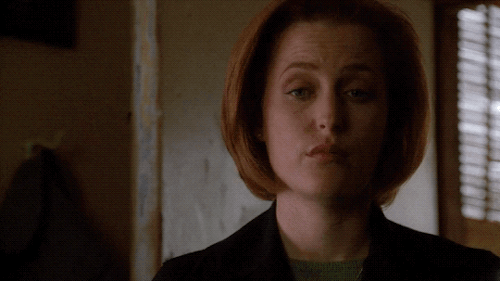
7) Allison Janney is someone who I love in literally everything I’ve seen her in. Even when she’s pretty much the straight man in this, the CIA director, I am just drawn to her. I just really fucking love Allison Janney.
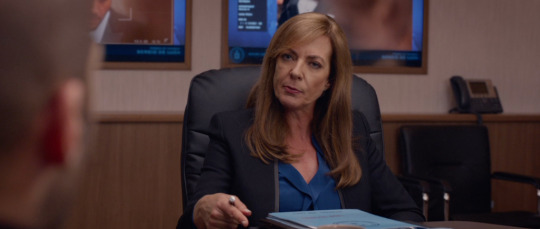
8) Jason Statham as Ford.

Holy fucking shit. Somehow Jason Statham is in a movie with modern day comedic legend Melissa McCarthy and ends up being the funniest person in the film. He is totally committed to Ford’s arrogance, jackass qualities, intensity, and hyper masculinity in a way which is 100% hysterical! It’s a tricky business because Ford doesn’t think he’s funny. Ford doesn’t think he’s weird or an idiot, and Statham plays it like that knowing it will derive the most laughs. Ford is basically the super testosterone filled action hero in every movie ever and Statham doubles that while stealing every single fucking scene he’s in. And his chemistry with McCarthy is off the charts funny! Melissa McCarthy is the bedrock this film rests upon but Jason Statham is the fucking cherry on top (I think I’m mixing my metaphors but whatever), he is absolutely amazing.
9) I love this because it makes me angry.
CIA Director Elaine Crocker [about why Fine pressured Susan to stay out of the field]: “Yeah, he sniped you.”

THIS IS REAL! THIS IS FUCKING REAL! MEN IN CHARGE KEEPING WOMEN DOWN BECAUSE THEY’RE WOMEN, WHETHER THEY KNOW THAT’S WHAT THEY’RE DOING OR NOT! GAH! I mean, the film including it is fucking awesome and handled really fucking well but holy shit it pisses me off that this is even a thing.
10) I find it endlessly frustrating (and I think I’m supposed to) that all of Susan’s aliases and spy gear are not the “sexy” stuff but things which could be considered “frumpy”. Why can’t she be a gorgeous baroness with a super slick ride and men on her shoulders? Have you seen Melissa McCarthy? She’s fucking gorgeous.
11) Melissa McCarthy has a very strong chemistry with Miranda Hart, who plays Susan’s best friend Chummy in the film. Their relationship in many ways is much more important than the ones Susan has with any other character in the film, including Fine. And you understand how good friends they are with each other as the movie continues. It’s really great.

12) Ugh.
Ford [after McCarthy points out he didn’t even like Fine]: “It’s called the rivalry of men!”
As a man I can say, “The rivalry of men,” is the equivalent of, “who’s dick is bigger,” because society has convinced us that we’re not a “real man” unless we’re the “biggest” man in the room. It’s fucking stupid.
13) One of the key things that makes Susan as strong a character as she is are her motivations. You understand what is driving her VERY clearly: her memory of Fine. It evolves into more than that as the film goes, it evolves into her just doing her job, but you understand why she does things which are outside of her norm. It’s because she is in pain over Fine’s (supposed) death and needs to make right by him. It’s clear and powerful and helps make the film as good as it is.
14) Aldo - as portrayed by Peter Serafinowicz (legendary character actor who can be found in Shaun of the Dead, Guardians of the Galaxy, the voice of Darth Maul in Star Wars: Episode I, and most recently “The Tick” on Amazon) is incredibly funny. Every overly sexualized moment with him & just his general chemistry with McCarthy makes him a worthy addition to the already stellar ensemble cast.

15) As I mentioned in note #10, I don’t understand why McCarthy is given all the frumpy gadgets and covers when she can pull this off:
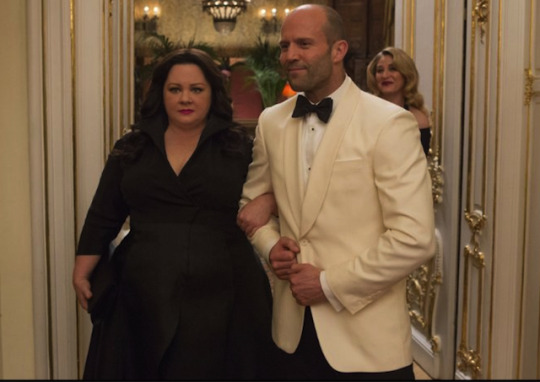
She’s fucking gorgeous.
16) I’ve mentioned this with a few pairings before, but McCarthy and Statham have this intense/incredible comedic chemistry which is born out of their strong bickering. This is most plainly seen when they're both at the hotel/casino arguing and I think the fact I’ve mentioned it so often is just a sign of how well put together this fucking cast is.
17) There is an incredible sense of tension that plays through most scenes (for example: when Chummy is trying to kill power to the casino) which ties into what I mentioned in note #3: it helps elevate the film over silly spy spoof into this engaging and riveting action comedy.
18) Rose Byrne as Rayna.

Rayna was apparently originally written as a 19 year old girl (this according to IMDb’s trivia section), which makes a LOT of sense considering how much of a BRAT she is. Don’t get me wrong, Byrne is absolutely excellent at giving of the appearance of this elegant and sophisticated socialite. But that’s where the humor is from. The juxtaposition between what you expect from her (a refined Bond villainess) and what she actually is: a moronic spoiled brat. Byrne plays the humor and juxtaposition perfectly. The key part is that - like Statham - she’s not actively going for laughs. She’s not hyping up the stupidity or the silliness, acting like Rayna knows she’s stupid, but instead trusting the script and playing it in a way where Rayna takes herself seriously. And THAT’S the gag! And it’s great!
19) At this point Rayna has called Susan a child multiple times, compared her to a depress homeless clown, and insulted her ability to address herself.
Susan [to Rayna]: “Why are you being so nice to me?”
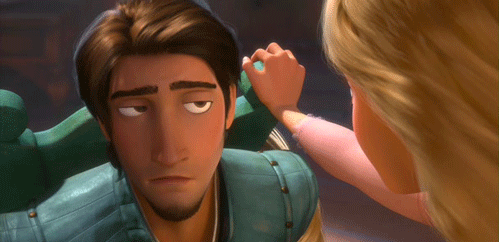
20) I’m starting to sound like a broken record but McCarthy’s ability to hold her own against how Byrne plays Rayna’s horridness is a testament to her talents as an actress and the chemistry between the pair. God, this movie is just so fucking funny.
21) I mentioned earlier that McCarthy gets the chance to play Susan as both more reserved and brash. It is when McCarthy is acting like “Amber Valentine” (the cover Susan uses to make Rayna trust her) that she gets to show off this aggression WONDERFULLY. It’s also wildly cathartic because a lot of people - including Rayna - have just been consistently putting Susan down for the ENTIRE film. Now she gets to go off on them and it’s amazing.

22) I’d like to point out that very few women die or get “fridged” in this film, not when compared to the men. I think during the entire movie only one woman dies but that’s a nice proportion swap to most male dominated action films. (How many women have died on Bond movies versus the men?)
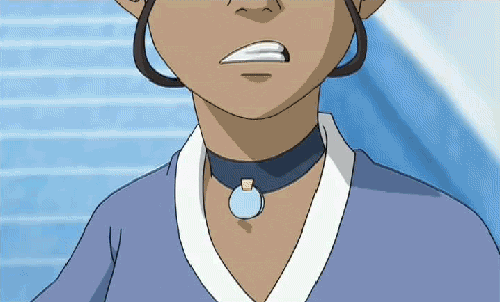
(GIF source unknown [if this is your GIF please let me know].)
23) The Budapest car chase scene is one of the strongest action set pieces in the film. It’s filled with this intense and enjoyable action, sprinkled with just enough jokes to make it hysterical, it’s well choreographed, and just altogether a fun ride.

24) But even the Budapest car chase can’t compare with the kitchen fight.

The action is INCREDIBLY well done. The fight choreography and energy throughout is just truly kinetic and it just grabs your attention and NEVER lets go. It’s just insanely well done and by far the best scene of the film.
25) I would like to point out - similarly as I did in note #4 - that Fine is kind of a jerk to Susan. He attributes her continued success to Rayna’s inexperience just casually, like it’s no big deal, not realizing he just undermined all the amazing things she just did in this film. Meanwhile the creepy sexpot of Aldo supports Susan and reminds her she’s been doing an incredible job in this film.

26) When Susan learns that Fine is alive, her entire initial motivation for going the distance of being a spy is gone. But that doesn’t matter because she’s not doing this for any man anymore. She’s doing this because it’s the right thing to do and because she knows she CAN do it. I love that. And when Susan embraces this and kicks some serious ass, Fine sees her for who she is.
27) Wait…I just realized that Ford didn’t actually DO anything in this film. He just kept getting caught and screwing up.

I love that! It’s so much funnier for me that way! :D
28) I love that it’s Chummy who saves Susan in the end. Not Fine, not Ford, but her best gal pal. Friendship over romance/sexual attraction is something I really appreciate.
29) And by the time the film ends, all three of the main guys - Aldo, Fine, and Ford - want Susan now. But she doesn’t chose a guy, she choses Chummy. She choses a night out with her girls instead of even Fine, the guy she’s been pining over FOREVER. I love that.

Spy is an incredibly funny and heartfelt film with a powerful message about competence/self worth. Melissa McCarthy gives an absolutely stellar performance and is surrounded by a just as strong supporting cast, with Jason Statham being a particular stand out. The action is crazy, the humor is spot on, the characters are well developed, and the relationships are pure. All in all, it’s just a really freaking good movie I think everyone should see.
#Spy#Susan Cooper#Melissa McCarthy#Jason Statham#Rose Byrne#Jude Law#Paul Feig#Miranda Hart#Morena Baccarin#Allison Janney#Peter Serafinowicz#Epic Movie (Re)Watch#Take That Sexism#Movie#Film#GIF
343 notes
·
View notes
Text
Case Study: Cassandra, Damian, and Tim
I read Batman: Gates of Gotham just now because my library happened to have it and it actually includes Cassandra (!). It might also be the last substantial appearance of Cassandra/Black Bat in the Post-Crisis canon (!!!). Naturally, I have to wax poetic about it with panels and long diatribes concerning batsibling relationships.
Context: Gates of Gotham (GoG) is a five-issue limited series published in May 2011, making it a very late addition to canon before the New 52 launched around September. At least, I’m pretty sure this is a canon story. Scott Snyder got first billing on the cover, so I wouldn’t be surprised if this story was prototyping some of the stuff for the Court of Owls.
But who cares about canonicity when we get Cass, Damian and Tim all interacting in the same book?!
(Quick shout out to renaroo who did a breakdown of Cass and Damian in GoG back in 2016. Go look at it! I’ll be reblogging it before this post as well.)
(TL;DR at the bottom.)
For clarity, our main cast is Dick as Batman, Damian as Robin, Tim as Red Robin, and Cassandra as Black Bat. Stephanie, Jason, and Barbara do not appear; Bruce puts in a very brief cameo at the end.
GoG immediately establishes that Batman and Red Robin are working on an explosives smuggling case together, and within a few pages elaborates Red Robin’s also in close contact with Black Bat. Dick admits he didn’t even know Cassandra was in town until she pops up at home base, which makes sense; Cass at this point in canon operates out of Hong Kong, so Dick has no immediate reason to know what’s she’s up to. Tim, on the other hand, is completely unsurprised; apparently he’s been working the case with Cass before he brought it to Dick’s attention.
So in the very beginning of GoG, we have a three-way team-up that started as Black Bat reaching out to Red Robin, who then contacted Batman. Which, honestly, I think is cool? Cassandra went to Tim first when the smuggling left her territory - I’m already getting warm fuzzies about the implied working relationship.
In the same page as Cassandra’s entrance, we get Damian and this super telling panel:
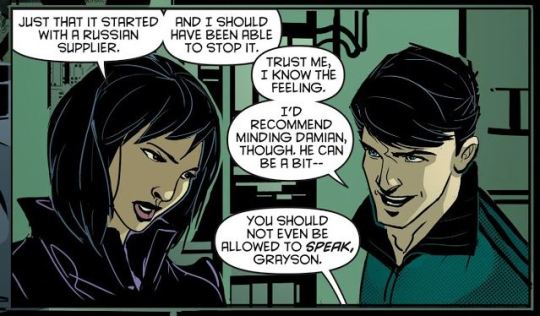
Now, I’m pretty sure that the way Dick is saying “I’d recommend minding Damian” is implying that this is Cassandra’s first real encounter with the kid. We are seeing history in the making here, folks. Or we would be if Cass hadn’t been reset in the New 52.
Then we get the next page:
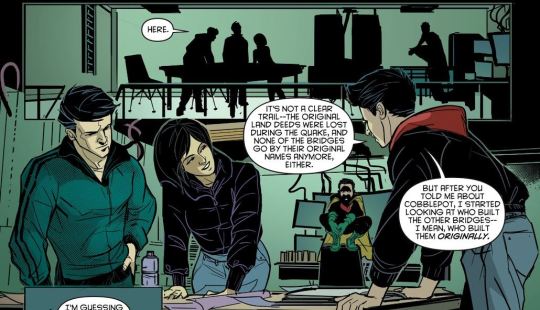
Notice all that visual distance between Damian and his siblings in the first panel as well as the way he’s rendered creepily in shadow in the second. It’s a rather isolating composition choice, portraying Damian as the outsider while his siblings are comfortably close together, enjoying a dynamic that existed before he joined the family. No one told Damian to stay back, but no one’s encouraging him to come forward either, so the distance kind of settles in.
I would also like to point out that when one of his siblings does look back towards him, it’s Cassandra, not Dick.
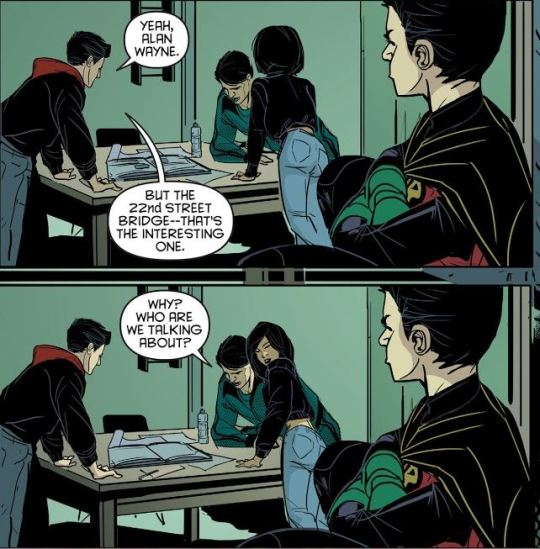
Skipping forward through plot and stuff, we next get Black Bat and Robin watching over the Iceberg Lounge. Whoo, team-up! There’s a lot to parse here.
Robin makes it clear he’s not thrilled with being on the Penguin Protection Detail (makes sense in context) before we get all of this:
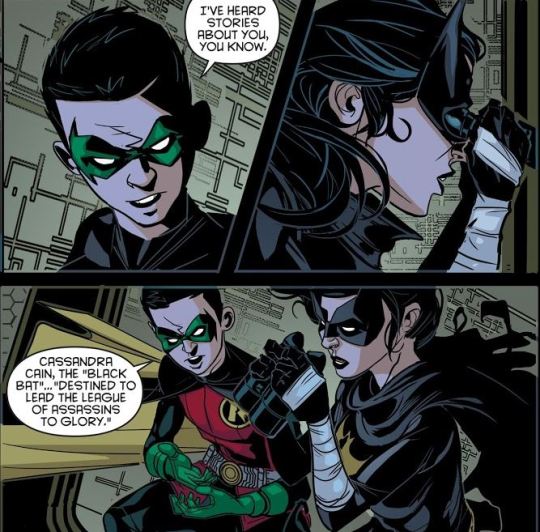


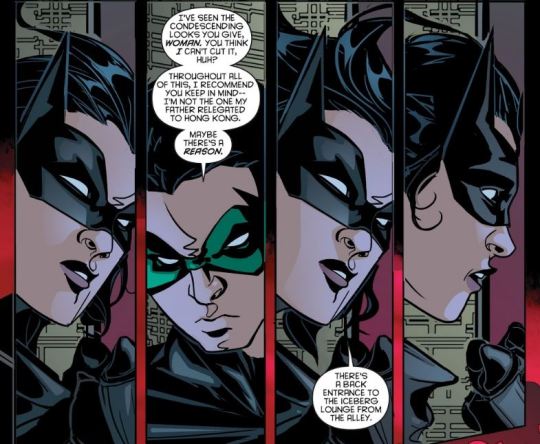
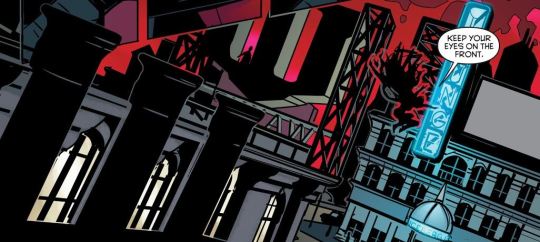
Wow, okay, Damian, calm your jets.
Let’s break this down. Damian starts with saying he’s heard about Cass specifically as “Black Bat” and as the one “destined to lead the League of Assassins to glory.” I find it super interesting that Damian focused on Cass’s League connections rather than her career as Batgirl here; is Damian still using the League as a marker of quality and ability like he would have before he was Robin? Or is Damian making an indirect link between himself, the other League kid, and Cass? Could be both...personally I’d say both.
There’s a beat panel of Cass after Damian says that first bit - I included it here because the timing seems intentional. I doubt Cass is super proud of her reputation in the League, so I think the beat is a bit of hesitation, a bit of her wanting to avoid this becoming a proper conversation.
Then we have “I have to admit -- I’m not impressed.” And Cass specifically looks over at Damian rather than ignore him (contrast the beat panel).
The thing where Damian says Cass should stop giving him condescending looks...oh boy. I’m 98% sure Damian is barking up the wrong tree here. Actually, 99.9% sure. He’s reading condescension and hostility where there really isn’t any to be found, and the ensuing defensiveness is causing him to lash out with his own condescending remarks. “I’m not the one Father relegated to Hong Kong. Maybe there’s a reason.” This is both super rude and greatly undersells Cassandra’s skills, but it’s more a reflection on Damian’s own insecurity with his position that this is the insult he throws at a fellow Batsibling.
Cass, for her part, does not engage with the insult. She turns the other cheek, reminding Damian without explicitly reminding him that they’re on a job. That said, her stoic reaction doesn’t necessarily mean that Damian’s dig doesn’t bother her. In fact, I think her next conversation with Tim indicates that it does bother her.
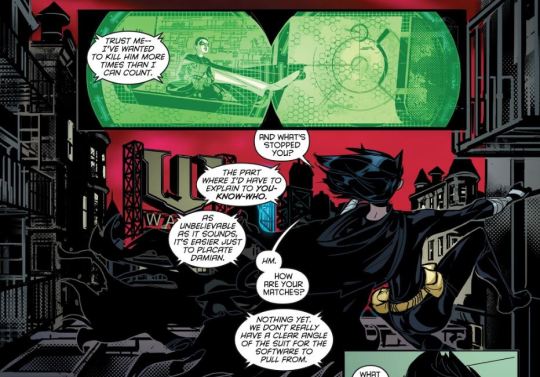
Think about the context - what Cass would have said first - that Tim’s response was “Trust me -- I’ve wanted to kill him more times than I can count.” Granted, Tim is taking his dislike of Damian to it’s logical extreme here, but it sounds like he’s commiserating with a Cass that is more than a little put out by an unwarranted attack on her person.
Which, leads us right into Tim and Cass in this arc. I’ve only read a little bit of Tim, but I’m getting the impression that he’s the type of person that shit-talks about people he or someone else is angry with (eg Damian) in the company of people he trusts (eg Cassandra). Since Cass is kind of pissed at Damian, Tim shit-talks about him on her behalf - like when one sibling has a bad breakup and the other sibling goes off on a “why I never liked that person” rant. Not the best coping mechanism since it can easily turn into nasty gossip (and that’s still your little brother, Tim), but that’s what he’s doing in this panel.
And rather than correct him and dismiss Tim’s own very real frustration OR agree with him and feed into the unhealthy dynamic, Cassandra listens without passing a final judgement. Maybe I’m reading too much into her “hm” here, but I’m translating it as “I see what you mean, thanks for sharing” - not a��“yes”, not a “no”. Good older sibling middle-ground, basically.
Right after that, we have Cassandra complimenting Tim’s problem-solving skills.
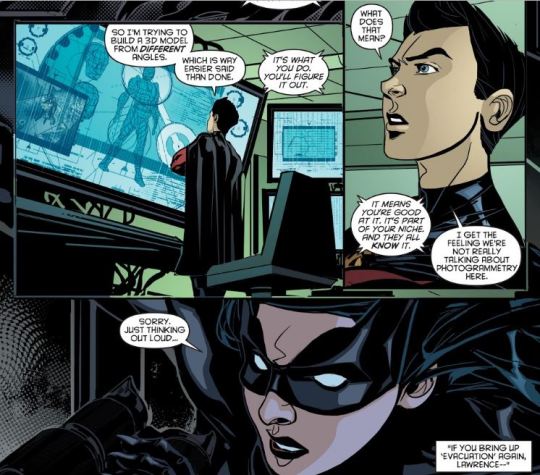
Which? This is so sweet? “It’s what you do. You’ll figure it out.” “It’s part of your niche. And they all know it.” Cassandra has this easy faith in Tim to figure shit out, and Tim’s not quite grasping how deep her faith goes. I will never get over my positive Cass-Tim relationship, okay? More fanworks need to capitalize on this.
After this there’s some bombs. While Batman deals with his own elsewhere in the city, Robin tries to disarm the bomb in the Iceberg Lounge while Black Bat evacuates.
He doesn’t succeed, which leads to this:
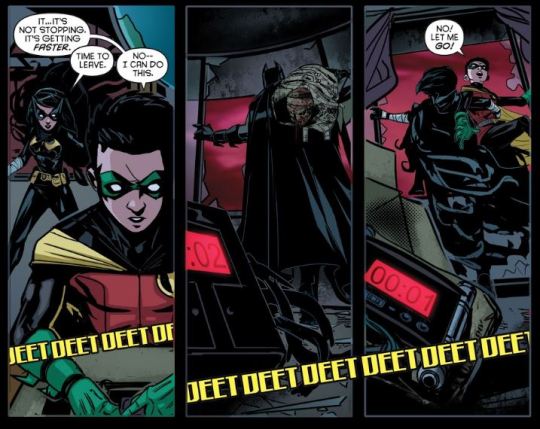
(Middle panel is Batman - ignore that one)
Two things here: 1) Robin does not want to give up, even when it’s very clear that he’s completely out of time. 2) Black Bat gave him as much time as she possibly could (there’s one second on that clock, guys) before picking up her little brother and bodily removing him.
Aftermath:
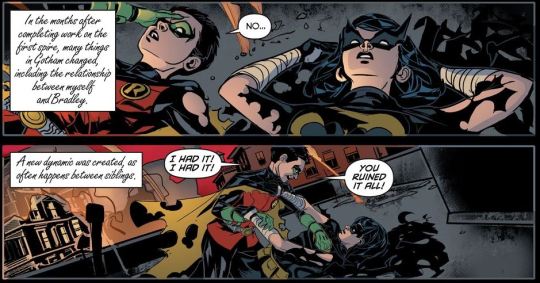

This might be my favorite scene with these two. Damian is angry, frustrated, and he feels like Black Bat forced him (allowed him) to fail. Meanwhile, Cassandra reminds him that she doesn’t care about failure because what matters is Damian is still alive. Here’s Damian who had a chance to prove himself, apparently blew it, and is now getting huffy with his rescuer. And here’s Cassandra pinning him to the roof, making him listen as she reminds him that he doesn’t have to prove himself, she loves him and just wants him to live.
Cass is best big sis, is all I’m saying.
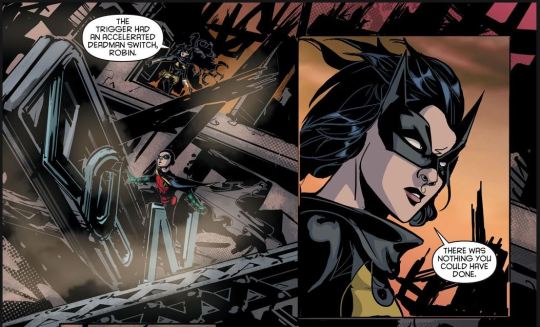
And when Damian is at a loss, his default MO is to take parting shots at whoever’s around.
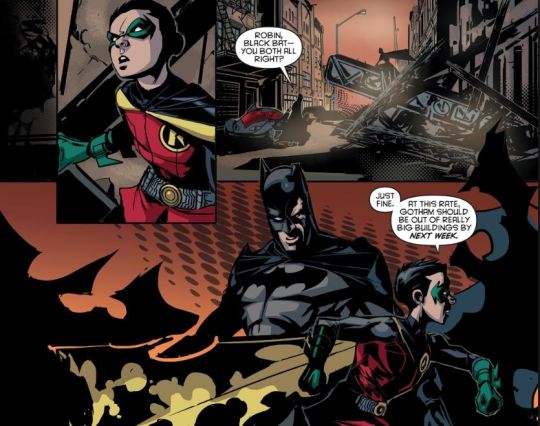
And hey, having Dickbats in this last panel, let’s mention a few things about him.
Here’s his thoughts about the whole bomb situation:
“When I was Robin, I always thought I could be as good as Bruce was. But now...I’m standing in the debris of his tower and I can’t help but thing -- he would never have let it get this far.”
(Dick has a problem with holding himself to impossible standards and building Bruce up in his head.)
And Dick’s thoughts on Tim:
“Even as Tim explains what he found, I can’t stop thinking about how much I rely on him. He’s a better Robin that I ever was. He’ll probably end up being a better Batman, too.”
(Dick’s still putting himself down, but at least we get Dick also having a lot of faith in Tim. Lonely Place of Living disagrees with the Tim-Batman assessment, though.)
Next up, Tim-Damian team-up! They both sound super excited about it [/sarcasm].

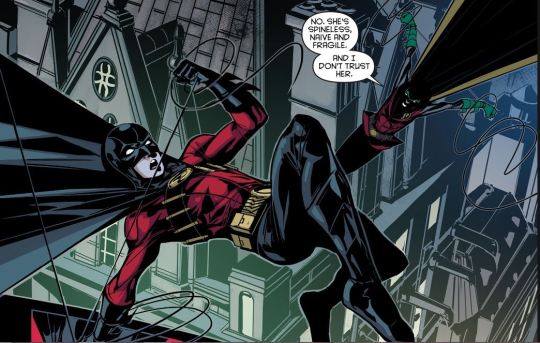
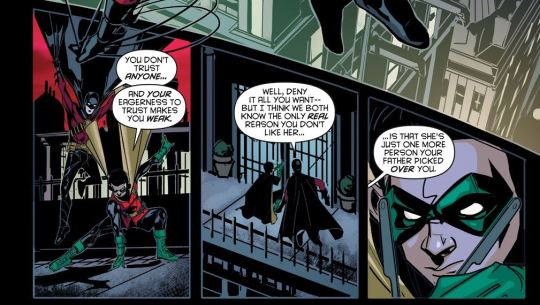
Yikes.
In defense of Tim, Damian is in full Undeserved Insult Mode here. We start with Tim’s refute of Damian calling Cass useless, then Damian calls her “spineless, naive and fragile”, and finally we have him calling Tim’s “eagerness to trust” a weakness. That’s three insults in as many sentences, two of which were aimed at a shared sister who Tim trusts and admires. Not to mention Cass saved Damian’s butt not very long ago while reassuring him that his “failure” to disarm the bomb was not his fault.
Damian is a kid, yes, but he’s also mature enough to run around Gotham and exercise judgement about how to balance lives as a vigilante. He really should be held accountable for the stuff that comes out of his mouth, and I can’t blame Tim for losing his cool.
That said, Tim is savage as fuck, holy shit.
“Well, deny it all you want -- but I think we both know the only real reason you don’t like her...is that she’s just one more person your father picked over you.”
Tim has a talent for discerning weakness in a person and exploiting the shit out of it to maximum effect. With Damian, this means using well-placed words to emphasize his feelings of insecurity and inadequacy next to his adopted siblings. It’s fucked up and not constructive at all - pointing out flaws like this doesn’t encourage Damian to change. But Tim doesn’t want Damian to change - he wants him to shut up.
Just look at his responses: a simple denial that Cass isn’t useless, a dismissal of Damian’s mistrust, and a piercing comment on his daddy-sibling issues. The first two responses are not necessarily rude - a sign that Tim’s not actively picking a fight - but they’re not invitations to talk or well-meaning corrections. When Damian says rude shit, Tim shuts him down and isn’t afraid to get nasty back. He has no interest in playing the part of the patient older sibling.
(Cue arguments about whether the onus is on Tim to give a damn, Damian to chill the fuck out, or Dick/Cass/Bruce/an actual adult to sit these two down and reach some understanding. Personally, I think these two need a proper adult.)
That said, both Tim and Damian look out for each other while fighting, so their relationship could definitely be worse.
Coming up to the final issue of this miniseries, Cass and Damian work together to deal with a bigger version of the bomb from last time. The plan involves moving the bomb instead of disarming it. Importantly, Cass asks Damian to trust her and he does, without dissent or hesitation. I see progress!
Finally, Cass visits Tim, who was out of the climax due to a concussion. They have a short heart-to-heart thing, during which Tim kind of blames Damian for blowing up the Batboat while Cass defends that “we kind of did that together.” I don’t feel like posting panels of this scene, but it’s nice enough.
TL;DR: GoG features a rocky but promising start to Cassandra and Damian’s relationship before the New 52 erased it. Damian makes a bit of an ass of himself, but Cassandra has sufficient chill that they end this arc on a good note. I would be looking forward to more if not for the Orphan reboot, I will never not be salty about this.
Cassandra and Tim continue to have a strong relationship, trusting each other both professionally and personally. More people should explore this dynamic, and I’m looking forward to catching up on the canon between GoG and early Batgirl (aka where I actually am in my comic reading).
Tim and Damian continue to bring out the worst in each other. Swear to god, someone needs to just shove them in a closet with a counselor or something.
Generally, GoG was a fun read. Cass is mostly in-character, and I’m a sucker for self-contained Gotham stories with no crossovers and no weird magic/alien shenanigans. I’d recommend it.
#batman#meta#character study#comic panel#cassandra cain#damian wayne#tim drake#dick grayson#this got really long#lots of pics#note that damian did not immediately take to cassandra#it's a work in progress#tim and damian have no chill#someone stage an intervention for those two#cass and tim love each other#spread the word#batfam#batfamily
86 notes
·
View notes
Text
Wednesday Roundup 8.11.2017
First of all, shoutout and special thanks to my patrons on Patreon, who for as little as $1 per project each month are helping me to grow and expand what I do here on renaramblesaboutcomics and all my other blogs and projects including starting up my own comic. So special thanks to c. win, Erin Jenne, Iz, Keerthana Krosuri, OwlKnight, Rebecca Luu, and Steph.
Now, for this week in comics we have another full and healthy week of comics coming out from almost all the major publishers and then some! But how will they survive my new FIVE STAR RANKING SYSTEM. i mean it’s not that big of a deal, it’s the same as any five point rating scale but the point remains.

Tesladyne’s Atomic Robo and the Spectre of Tomorrow, DC’s Batgirl and the Birds of Prey, DC’s DC Essentials Catalog 2018, DC’s Justice League Day, Viz’s My Hero Academia, Marvel’s Old Man Logan, Dark Horse’s Overwatch, Marvel’s Runaways, DC’s Superman - Action Comics, IDW’s Teenage Mutant Ninja Turtles/Ghostbusters II, DC’s Titans, IDW’s Transformers: First Strike
Tesladyne’s Atomic Robo and the Spectre of Tomorrow #1 Brian Clevinger, Scott Wegener, Anthony Clark, Jeff Powell

To say I have been curious about how Atomic Robo was going to deal with the current political and scientific landscape is sincerely an understatement, because I have been just sitting on edge, wondering if we would be getting another historical arc or at least placed in the not-so-distant past for context. After all, here in America that hasn’t really been an anti-science climate quite like there is right now. At least not within my own lifetime.
But, of course, I should have had far more faith in the foresight and boldness that Clevinger and Wegener have always shown in their craft. Which, of course, is a perfect description of their ongoing science-adventure epic Atomic Robo, because for as scientifically and fiction minded as the pulp adventures are, the fact that it is art is undeniable.
Art is about communicating concepts and ideas, and as scientifically minded as Robo and his team of scientists at Tesladyne may be, and as much as science based nerds like myself appreciate how the science is not bent or broken entirely for the sake of the storytelling, it is masterful at portraying science in a way that is accessible and, most important of all as it relates to Robo, humanizing.
While it’s a slow start to this new arc, what really drives it home is Robo’s frustration and sacrifice for the sake of his dream, and how ignoring the human elements has allowed the politics and general climate of the world around him to drown out his work and inhibit him. Even if the only insight we get to the hurdles is his humorous annoyance with the desert’s self-proclaimed HOA that is between himself, Elon Musk, and Sir Richard Branson, the imposing and overly restrictive hold of Red Tape and permit seeking is imposing all throughout the issue, even for the major parts of it center more around the wily antics and return of young Foley.
And of course, it wouldn’t be Robo without major hinting toward something larger and unexpected to come.
It’s not the most perfect introduction to an arc, especially not for Atomic Robo which has at times had some of the most engaging first issues of almost any long form comic I’ve seen, we are talking about a comic where the electricity-driven skeleton of Thomas Edison is a villain. So it is just short of the high bar that it has set for itself, but even falling short Atomic Robo manages to be one of the best comics of a given week. That for me is justification enough for a solid 4/5 Stars.

DC’s DC Essentials Catalog 2018

Straight up, I am not a fan of Catalogues and I’m definitely almost never in agreement with the books they choose for each of the catalogue’s sections. So it’s not like I’m going to be less than truthful with this guy.
But my harshness is probably best explained as to why I’m being harsh, after all most people would not care that much about what is essentially a free throw-in with someone’s pull list in the week. And, honestly, my answer there is that because it’s free, because it’s promotional and being pushed onto new readers, its viability as a good entry level or at least how helpful it is as a guide for interested new readers, increases exponentially here.
So how does it work on that level, especially with the release of the Justice League movie looming over DC currently? How likely will this persuade a new reader to start getting more submersed into the comic books it’s trying to represent?
Annnnnd the answer there is not great?
There’s a short comic at the start, introducing the Justice League and wow is it a testament to how out of touch the lineup is with the increasingly diverse culture of nerds and comic book fandom. Five beefy white guys, one white woman, and one black man. Like it’s seven years into the new DC Universe (technically) and you couldn’t trade anyone here out for some more, less milk toast characters by this point? Hal Jordan couldn’t be traded out for any other Lanterns at all? It’s annoying. And at least something the Justice League movie will be at least somewhat better at thanks to the very awesome casting of Jason Mamoa as Aquaman.
But that’s still only a small part of this issue. The rest of it, and by that admission the vast majority of this digital freebie is dedicated to the “essential reading” of DC as of 2018. And much like the lineup of their premiere team, DC has repeatedly proven in the last couple of years that they... don’t know what to suggest. Most notoriously there was the Essentials collection where they literally had a section for each of the male Justice League members and like. One book for Wonder Woman. That was embarrassing and if we had anything remotely similar it would be our first 1 star of the new rating system, but it’s honestly a much longer, much more thorough and comprehensive version of a reading list for DC and in that way, while still not a “standard” or “satisfactory” example of how to really capture the attention of new fans, and its choices aren’t always the most coherent alongside each other, it doesn’t completely fail at its mission by my estimate.

DC’s Batgirl and the Birds of Prey (2016-present) #16 Julie Benson, Shawna Benson, Roge Antonio, Marcelo Maiolo

The Benson sisters already have to win me over after the first arc of this series which I found terribly disappointing so far as uniting the team that I know and love as the Birds of Prey and not really being on board with the last issue for all the reasons I said in this review.
So I was somewhat apprehensive from the start but, honestly, if you follow this blog for a while you know I’m a sucker for giant superhero team-up storylines and am really willing to hold my sense of disbelief a lot more than even what I regularly do for comics.
....
So why are the villains of this team-up literally militarized paper feminists in.... well, in the United States the first thing that comes to mind when a lot of white people wear uniformed cloaks with hoods and masks is the KKK, of course these masks are old plague doctor masks that double for some kind of... gas. Okay.
But like. Considering the current environment in not just the US but the whole world... just putting into words “the real problems in the world right now are radical feminists” here and having our superheroes literally say “Not all men in Gotham”... If I’m being generous this is a whole lot of shady and uncomfortable. If we’re not supposed to read deeper into this, then why the surface level imagery and blanket statements that so immediately bring to mind current issues. If we’re supposed to read deeper why does it feel so unrewarding with none of the characters having enough time in a team-up this large to really experience the events any deeper than surface level.
And there’s still not even a mention of how this event would effect trans men or women, or how this disease is even supposed to be effecting only people who identify as men to begin with. It’s apparently scientifically based according to this issue and the continued mention of medical investigation from Ivy and the villains themselves. If someone claims it’s due to the Y chromosome then trans and nonbinary people would be effected differently on a case by case basis, giving the medical community a pretty quick idea of what was happening. Not to mention that XXY women and men, XYY men, XXX women, and so on should be effected differently. Now I’m not expecting a comic book writer to write a genetics dissertation for research on a comic idea but if they want to be a mature or adult comic in subject matter, then high school biology should not immediately tear their entire plot apart.
I just. Really feel like this book wanted an all-female superhero team-up and thought there needed to be justification for why the men weren’t around instead of it just.... being unsaid as to why there weren’t men on the team. And things have spiraled out from there. On top of that, the art is not strong enough to regain the things that are lost in what is a clustered and puddle deep storyline.
These sorts of team ups are best when the subject being dealt with is not so politically or culturally charged, or when there is very clearly a reason for each of the present characters to be in the exact positions that they are in. And so far this crossover hasn’t really managed to believably pull this off.

DC’s Justice League #1 - Justice League Day 2017 Special Edition Geoff Johns, Jim Lee, Scott Williams, Alex Sinclair

This issue is really a sampler for the larger issue that is Justice League (2011-2016) #1 which... I’ll be honest, has not aged the best of the Justice League origins that I commonly think of, and really the fact that this sample contains pretty much no Wonder Woman or Flash, it’s hard to really see why outside of this scene between Batman and Green Lantern which has become somewhat iconic in the superhero community, I don’t really get.
I mean, the scene itself is so anti-climactic specifically because it ends with Batman stealing Green Lantern’s power ring to prove that Batman Is Always The Best Period. And if you’re of my persuasion in the comic reading landscape, that probably means you just rolled your eyes as much as I usually do at those sentiments
This is probably okay for a new, entry level fan to pick up for free, but personally I feel like I’ve picked up this particular freebie now five times for different FCBDs or other marketing pushes DC has had in the past six years and it’s just not enough that I’d consider it worth more than sacrificing the literal $0.99 it would cost you to pick up the whole issue on the same website.

Viz’s My Hero Academia (2014-present) Vol. 10 Kohei Horikoshi

I have been making more of an effort lately to keep away from any spoilers to My Hero Academia, be it the anime or the manga, and while it’s not always the easiest thing to do on a content aggregator like tumblr, it’s an effort I’m particularly happy with myself for doing because I love this series. And one thing I love about this series is how it seems so familiar and yet, time and time again, I am floored by the changes and impact it makes through those choices. It’s honestly astounding.
And for this volume, that wait is paid off because of the unique choices that are made throughout it in dealing with Katsuki Bakugo, Deku’s childhood friend and rival who seems to be, easily, the most surface level and simple of the class of 1A, especially among Deku and his friends, and yet is continuously shown throughout here to have something much better and greater about him.
And while Katskui and his choices which ultimately subvert and turn on its head the trope that he seemed to so easily be fitting into throughout the previous nine volumes of content are the most interesting and engaging storyline of this book, he’s by far not the only one to shine in the volume. Deku, of course, being our main gets lots of great moments and we get to see him really develop his skills and instincts as a hero, but the entire gang of 1A classmates in this volume are really shown to grow from the characters we met back in the first volume of the story. They are reckless without completely losing sense and reason, they’re cautious without allowing written rules to inhibit them from what they know is right, and more than anything, they are all coming to recognize that something special in each other and especially in Deku and Katsuki which the two of them have been able to see all along. And it’s honestly all rather wonderful.
This volume also has more attention paid to the adult heroes and what they’re doing the serious responsibility they take in protecting and saving their charges. Which is a bit of superrealism sprinkled in this story that really elevates it above a lot of stories meant for young readers, especially shōnen.
The art’s always great, the story is not like anything else you’ll read East or West, and there honestly just aren’t characters like this you’ll see in other stories all with as much care and development as they have in My Hero Academia and that’s part of why it is so special and deserving of 5/5 stars.

Marvel’s Old Man Logan - Marvel Legacy Primer Pages Robbie Thompson, Andrea Sorrentino

Of the freebie samplers, the ones that I tend to be the most interested in, at least for this week, are the ones that offer something additional to the things we’ve seen before. And in the case of Marvel’s “Legacy Primer Pages” marketing campaign, that’s exactly what the aim to do and actually achieve.
These are good little samples because not only are they uniquely written for this event and with this very intent behind them, but they are more importantly written by a writer I already really enjoy, Robbie Thompson, and all have different artists which not only tap into the style of the books being promoted bout also have a unique flare compared to the other “Legacy Primer Pages.”
In this case, I’ve never been particularly interested in the Old Man Logan books, as I’ve never been the biggest Mark Millar fan, but this is definitely a sample which gives me a good enough taste of what the universe is about and what Logan’s history is in it that I feel like I could readily pick up the next issue. I won’t. But I could. And that’s a delivery on the whole premise of the series.
Even if it’s super annoying that these things are 3 pages long.
A star earned for each page, I say.

Dark Horse’s Overwatch (2016-present) #13 Michael Chu, Ryan Benjamin, Anthony Washington

It’s been far too long since I read a good comic with Ryan Benjamin on art, it’s been sincerely missed in my usual comic appetite. As I’ve gone over quite a few times, the Overwatch comics Blizzard has been putting out has really gone the extra mile in helping someone like me who likes Overwatch but doesn’t really play the games to feel really immersed into the world they’ve created. And it’s in that way that I really enjoy reading these.
This whole issue seems a lot more plot driven than the rest of the comics, it seems to be in the present timeline, it’s showing the moves being made by the Talon operatives after the events we’ve seen unfold in previous issues and in the cinematics Blizzard has provided. And just overall it seems to have a much tighter schedule with a lot more direction than what has been expected.
It’s a little concerning to me that so many of the Talon operatives are heavily pulling from the more diverse characters in the franchise, but that’s not something I suspect rests squarely on the shoulders of this issue, obviously, but it is something I can look toward the writer of this issue, and the overall creative head of Overwatch’s story as a whole, Michael Chu. And with Chu writing it also makes sense why this feels a lot more plot driven.
All fo this aside, it’s a very nifty, very cool spy thriller from the perspective of the team of Bond villains, which has tight control of the characters and dialogue, and a wonderful use of a great artist whose style is fun yet very believable and action oriented.

Marvel’s Runaways (2017-present) #3 Rainbow Rowell, Kris Anka, Matthew Wilson

When you’re really analyzing and critiquing something, one of the things you have to ask yourself is what more could I ask of it? And I think when you’re torn about your personal, subjective impression of something and the quality of what you’re looking at, it’s important to ask that question and really analyze how much of a difference that can make.
For me, that question is particularly interesting in Runaways because while I’lm personally fairly new as a fan compared to some, I am still someone who has read through and fully submerged myself into the history of the characters up to this point and have a vested interest in seeing how they end up as characters and as a story outside of just “where are they now” more than just someone who was being newly introduced to these characters from this issue forward. And in that way, I can honestly say that Rainbow Rowell and Kris Anka have put together one of the most beautiful, slow paced, and yet completely rewarding personable comics I have read in a long time.
There’s not a lot of action, there’s an ongoing plot and a sense of danger and risk for our heroes, certainly, but at the end of the day the driving force of this plot and this narrative as a whole is and will remain the question “can they still be a family?”
And in that way, as much as my apprehensions remain, as much as my personal biases on where characters should go or should have gone, are completely overwhelmed by how much thought and care is put into every conversation, every action, every beautiful panel of this comic. And it is also in this way that I am just so blown way and impressed by the insight this comic has.
There are nitpicks, like I think that Karolina should have probably been more receptive and affectionate with Gert even through her surprise, but it’s hard for me to get nitpicky when I’m just so glad a book so much as exists, and can say it’s one comic that I look forward to immensely each and every month.
Definitely glad that this comic is continuing to earn every ounce of my support, 5/5.

DC’s Superman - Action Comics (2016-present) Vol. 4: The New World Dan Jurgens, Patch Zircher, Ian Churchill

I remember back when I was reading every bit of comic book criticism and review that I could find a few years ago, one analysis that I found profoundly changed the way I evaluated comics and how I chose to consume them, was coming across an analysis of the culture around comics, and that was that for most committed comic book fans, which I most certainly qualified as, aren’t really focused looking at individual comics as narrative fiction, but like reading a newspaper, keeping peripherally aware of things that are happening within a given universe.
Now, the crux of that analysis was that readers who do this should stop and not feed the beast, opting instead for comics which are wholly good and further narrative and critical thinking.
But, I’ll be honest. I don’t really look to do that with comics either. I absolutely understand and support using comics as a means to relax, a comfort. A romp. And if you read certain comics like newspapers.... hell, you’re still reading more than like half the entire planet each week. I don’t read the parts of the newspaper I don’t have an interest or investment in, and I don’t read comics I’m not at least interested in as well.
I just drop them and stop buying them.
But there are hundreds of comics published every week in America alone, and to buy and keep up with all of them on an issue-by-issue basis, especially if the vast majority are “standard” or lower, doesn’t make sense to me. If a comic isn’t something I “have” to have each week, I move it to a trade wait and buy it that way. And I go over this now not because I want to convert everyone to my way of reading comics, but as an explanation for why certain comics I’m obviously enjoying are moved to this latter experience compared to their “peers”
For me, the events of Action Comics was something I was peripherally aware of through other comics and context clues, but wouldn’t read for myself until I got enough of a story to really sit down and read all together.
Which is a good thing, because as with the common theme of this week, long form arcs are super difficult to do well and so it’s more powerful to read a whole story together once it’s done. Action’s “The New World” story does that, but what it does even more than that is it reestablishes a context for the Super Family in the Rebirth universe.
The start of this issue, really the entirety of the first issue of this arc, is dedicated to showing us the new timeline with retconning the older Super Family and Jon’s birth and growth into the current DCU events. And this is one of those issues that by itself, if I had paid full price for what ended up being a wiki entry to the new universe, I probably would have been super ticked. But in a volume like this, with a whole new story set up by it and cause for moving forward, I find this to be a really good way of telling new readers and friends interested in Superman to read this volume and get a small history for context before moving forward.
And let me just say, as confusing and over the top as the Superman mythos has gotten in the past six years? This was a good call on the writers’ part here. Even if I think that first issue definitely suffers from exposition fatigue.
Now, unrelated to my scoring, I will say that this does upset me as a long time Superman fan because they bought back one of my absolute favorite characters from the previous universe, Chris Kent, but then completely undid everything lovable about him, made him a generic looking foil badguy to Jon’s Superboy, and for the time being seem to have no plans on having his heartbreaking and heartwarming story of finding an adopted family that loves and accepts him in Clark and Lois be revitalized and used to really meaningfully change the bad handling he received less than a year after his invention before. And it’s really disheartening and depressing on a fan’s behalf.
All that said, this is a solid comic and a pretty easy jumping on point for new and old readers alike. It cleans up a lot of the continuity confusion that has been brought on in the last two years for the Super Family, and gives us a lot of solid team ups within the family. So for me, this is a good 3/5 stars.

IDW’s Teenage Mutant Ninja Turtles/Ghostbusters II (2017) #2 (of 5) Erik Burnham, Tom Waltz, Dan Schoening, Luis Antonio Delgado

Sometimes you enjoy a property so much that it becomes difficult to look at it with fresh eyes, and sometimes even worse that leads into a point where it takes a very special, a very extraordinary talent to come by and present you with something from that property that not only feels new and refreshing, but in many ways can almost feel like it’s a coming home of sorts.
When I read Burnham’s Ghostbusters or Waltz’s Teenage Mutant Ninja Turtles, I genuinely feel like it’s coming home to two of the teams that kind of helped me, like they helped a lot of kids, grow a real sense of self and exploration from a young age. There’s a line that’s sometimes difficult to explain to people when it comes to fiction but especially with comics and something as outlandish as the superhero and sci-fi genres, where the line is drawn between things that push the line for things to be ridiculously stupid into ridiculously amazing, but I think if there’s any comic that I would use it could very well be this issue.
The thing is, I mentioned before how I try to always think of a comic as being someone’s very first, and whether or not that would really provide them with anything that would entice a new reader to continue on. But I think there’s another perspective on that which can be just as relevant. And that would be the complicated question, if a comic has already found its audience, can it continue to reward and interest that audience?
And while I would always warn new readers when a comic doesn’t really meet the prior on average, I’m also comfortable with approaching a comic that knows its audience and, as a part of that audience, evaluating what I have gotten out of an issue. In that way, I feel like Ghostbusters/Teenage Mutant Ninja Turtles II is able to tap into something even decades-spanning properties like DC and Marvel are always juggling and struggling to maintain. It has an audience that Burnham and Waltz have personally been entertaining for almost a decade now, and so their main interests now are in rewarding those fans with the most payoff, the most development, and the most new spins on familiar faces that they can possibly give. And I think this is just another in a long list of examples of how they do that incredibly well.
This isn’t the only comic this week which is in the middle of a story, obviously, but I think of the available comics this one does the best job of doing something that I look at when examining an issue on its own. I ask myself, going into this issue from the last issue, what stakes are there and where (mentally or physically) are all the characters when the story starts, and do those things change by the end, and by how much. Sometimes, in a weak and drawn thin premise of a comic, those things don’t move the dial for the three or four middle issues that the story has, and it’s one of the reasons I am incredibly critical of long, 5+ issue storylines. They very rarely seem to fully payoff for what time and effort you invest in them by this measurement, especially in those middle issues.
Ghostbusters and Teenage Mutant Ninja Turtles are not those kinds of series, and their crossovers reflect that comfort that their teams bring to the table for these events. There’s an understanding of how much change is needed to reward the readers, and even if this is one of the incline issues taking us on our way to the climax very early in the story, it still manages to focus on the things we need to change within an issue.
In this case, that is character development and it’s something that these creators do fantastically well even with a huge ensemble cast. We have a lot of touching and vital moments for each of the characters, seeing the different groups bond and play off each other. It’s more than just the eggheads, the leaders, the comic reliefs, and the hotheads (respectively) together, it’s about taking those personalities and having them play off each other in a way that makes the characters reflect on themselves and the issues they’re not addressing in their personal arcs without being heavy handed.
Basically, if I could, I would teach a graduate level course on how these IDW comics understand how to make an ongoing comic’s individual issues maintain story structure while still contributing to an overall narrative.
It falls short of perfect, I still think it would be very difficult to tell someone new or fledgling in either property to pick it up, and I think that for a lot of people waiting each week, even it’s only a week, can be difficult with the price of comics these days, but it also feels so completely worth it for those of us already on the train.

DC’s Titans (2016-present) #17 Dan Abnett, Minkyu Jung, Mick Gray, Blond

A lot of people over the years have come along to debate me on my assertion that monthly comics should fix their publication method or write comic arcs to be four issues or shorter, and while that’s never been a position I deter from it’s one I am more than willing to hear other opinions are. There are good examples of stories that go on for longer.
But most of the time they don’t. And you end up with pretty run of the mill issues that take up the majority of the middle of the arc and more take away from the momentum of the storyline that had been building than anything else. This isn’t a complete condemnation of this arc, but it is a point I’m willing to stand on for this issue.
We start this issue with the exact same circumstances that we ended it in. Wally I is dead and Wally II is... around. Evil Future Donna reveals herself as the leader and the ultimate betrayer (more on that in a second). Mel and Gnarrk are still mind controlled. Other villains from the Titans’ pasts are also fighting for Donna.
Annnnd that’s it. This is the ultimate example of a filler issue that takes away from the momentum that had been building the entire time before all this happened. None of the characters are in a drastically different place, none of the personalities are changed, none of the circumstances are changed. t’s a lot of exposition and evil pondering that gives us... what is basically the cliffhanger from last issue -- is Donna evil? Will Wally live?
The stakes have not changed and thus this issue doesn’t add to the story. If anything, issues that pull stunts like this, basically pushing the pause button for another month, add to the reputation comics have that they have no real direction or conclusion to offer, that they just are endless cycles of the same game. And I’m saying that as a fan of not only comics, but of this series and this storyline. And it really doesn’t help its case that it all but flat out states a reference to “Who Is Donna Troy?”, a storyline that on one end of the spectrum could be a perfect example of a one-shot story that is self-contained and gives a change to the narrative and characterizations it touches... and on the other end of the spectrum is an example of convoluted retcons, disappointingly missed stakes, and a generally forgettable multipart “epic” that bit off more than it could chew. So we really could be barreling toward one side or the other.
For what it’s worth, I’m not at all saying that this is a terrible issue, but it’s a perfect example of why my skepticism toward comics which stretch stories to 6 issues or longer has grown as thick and impenetrable as it has. Issues of a comic series, like episodes of an ongoing TV show, are best served when you can either watch them on their own, or have demonstrably changed the stakes from the start of the issue/episode to the end, making it matter whether or not it is placed before or after the previous part of the story.
It also doesn’t help that this is the third-ish twist on the “Who Betrayed The Titans” thing they’ve had going for this story arc which has.. basically just been using as many twists as possible to try to combat the Information Age and how covers and solicits are released months in advance, making the element of surprise so questionable. Why else would they throw off the trail by having the traitor be Lilith and then maybe Dick and then maybe Roy and then, oh wait all the clues and lead up had been red herrings it’s Donna.... from the future... who turned evil because everyone died.... and now she wants to kill them earlier... Oh, comics.
On its own, this comic is a solid, standard issue, 3/5, but it’s going to contribute to the overall story arc feeling lax in pace and honestly stretched pretty thin in order to make it to that oh-so-desirable trade length.

IDW’s Transformers: First Strike (2017) #1 John Barber, Guido Guidi

It feels like over the past two years, as I’ve excitedly expanded my library for the IDW Transformers comics, I’ve had to deal with the ongoing struggle of following my favorite characters as they jump around between the various titles, and no two characters probably personify that more than Arcee and Kup right now. While I haven’t picked up Revolutionaries yet as I wait for the trade, I’ve enjoyed the general premise of the book from a distance and wondering if/when we’ll get more tie-ins to Sins of the Wreckers, which is where my love for Arcee and Kup has really been fostered.
This stand alone issue for First Strike is in itself fairly interesting. Even without a lot of the background from Revolutionaries or even the more recent arc of Optimus Prime, I followed the characters and relationships pretty easily. A good part of that is thanks to how John Barber’s consistent voice across all of the Hasbro line of properties has led to a real feeling of being able to follow the characters first and filling in for the storylines after. Which is a really good note for a multi-series shared universe like Transformers (and many other IDW properties) have become.
But that doesn’t entirely make it an easy read for newcomers jumping into the adventure. There is a lot with Blackrock and that whole nonsense (aka the main crux of the issue) that was really lost on me, and that cheapens the issue significantly when it goes for a “power of friendship” basically ending like this one does. It’s something that may very well easily be rewarding for more avid followers of the Revolutionaries storyline but not so much for my own limited perspective. That’s not necessarily a problem with the issue so much as it is for me.
What is a problem for the issue is the more inconsistent aspects of the art. Now, any Transformers fan is probably pre-packaged with a high tolerance for inconsistent proportions. That’s.... just part of the deal when you’re a Transformers fan. But even with that in mind, the changes characters would have with their sizes in this issue was really getting to me, especially with the humans serving as a consistent marker for height throughout.
I also felt that while the character art wasn’t bad, the tones and colors felt too bright and inconsistent with the surroundings, often not shifting shades even as the environment changed, which probably speaks more to the amount of time crunch here and not the actual quality of the digital colorists. But it is still pretty distracting even if you can’t exactly put your finger on why the characters seem to stand out so much to you as you read.
In general the issue is standard in a lot of ways, so I can’t say it’s the sort of jump on point that if you don’t love Transformers already you’ll be jumping over the moon for or something. It’s a good stand alone for a larger appreciative whole. And for me that’s a pretty solid, if just below exceptionalism, 3/5

Hey there! We finish up another pretty stellar week in comics with lots of stories and characters, and another pretty great time from yours truly. And if you enjoy these write-ups or anything else I do whether it be the Roundups, my Rambles, my personal creative projects, or you’re interested in my upcoming podcast, you can help contribute through donations to my Ko-Fi, Patreon, or PayPal. For as little as $1 per project, you make all of this possible.
You could also support me by going to my main blog, @renaroo, where I’ll soon be listing prices and more for art and writing commissions.

RenaRoo Ko-Fi

RenaRoo Patreon

RenaRoo PayPal
#Rena Roundups#Wednesday Spoilers#SPOILERS#Action Comics (2016 )#My Hero Academia (2014 )#DC Essentials Catalog 2018#Atomic Robo and the Spectre of Tomorrow#Overwatch (2016 )#Runaways (2017 )#Teenage Mutant Ninja Turtles/Ghostbusters II#Titans (2016 )#Batgirl and the Birds of Prey (2016 )#Justice League Day#Old Man Logan
4 notes
·
View notes
Note
Mod Keke here!
For starters, why would anyone, ever, consider "not shipping" something? That's ridiculous. You either like a ship dynamic or you don't. There no such thing as a “good” or “bad” ship. It boils down to the kind of fiction you like, and the kind of fiction you like does not, in any way, dictate what kind of person you are. It's 100% for fun and entertainment, and even the most normie normal person who has never heard of shipping in their life will liked fucked up ships, just in a more casual, non-fannish way. It's not that deep.
Taking a ship so seriously that you equate it to real life and judge whether or not someone is good or bad because of it is extremely disturbing and not a healthy way of engaging with fiction. If you don’t want to ship something because you think it’s “bad” to do so, you need healthier boundaries between reality and fiction. And maybe you also need to ditch the people who make you feel that way, because it’s super toxic.
With that out of the way...
Squip/Jeremy is the second most popular ship in the fandom. This is not a shock or surprise. Despite what the morality brigade might tell you, villain/protag ships have ALWAYS been extremely popular, and the more fucked up they are, the more popular they tend to be. Fluff and vanilla is nice and all, but antagonism keeps dynamics fun and interesting and leave room for all kinds of stories.
I prefer redeemed Squip, personally. I love the angst and the drama and the trauma, but I’m a sucker for happy endings. No matter how toxic and terrible Jeremy and Squip’s dynamic might be, Squip ultimately realizing their mistake and working to fix it because they love Jeremy That Much is fucking catnip. I love it. Can’t get enough. Slow burns are *chefs kiss*.
I also fucking LOVE any and all mind control and possession tropes. I’ve loved these tropes since I was 5. This is also extremely normal; most fetishes or kinks someone likes as an adult start when they’re young. I watched the fuck out of Yu-Gi-Oh because it was dripping with these tropes, and Yu-Gi-Oh is an anime for children. I read the Animorphs series, novels written for children, also because of this. I remember deliberately skipping ahead several books to the novel where Jake, one of the main protagonists, ends up mind controlled by a Yeerk (aka an alien brain slug). I was predisposed to love Squipemy because of this. Their entire dynamic is mind control/manipulation/possession, with the bonus of Squip doing all these things because they legitimately believe they’re helping Jeremy, and not for their own nefarious purposes. It’s fantastic, and you can do so much with it.
Another extremely popular trope I also like: Robots (or any other non-human being) learning how to love. You’ll see a lot of people justify saying the ship is “”bad”” because Squip is a ~computer~ and ~doesn’t have emotions~, as if that’s a bug and not a feature. It’s fanon, first of all. There’s no canon that states Squip is incapable of emotions. In fact, we see first hand on stage that Squip is capable of frustration, joy, and at the very end, fear. Both Jason Tam and Stewart Clarke (London Squip) have said they play their Squips as having feelings, and Stewart Clarke said in an interview several months ago that he believes Squip genuinely cares about Jeremy and his success. That’s hardly an emotionless computer.
Secondly, people fucking love the concept of something that isn’t human developing real emotions. You see this in Star Trek. You see this in novels and films from the 1950s. You see this in The Matrix, in Terminator, Wall-E, DBH. The list goes fucking on and on. There’s something innately satisfying about a thing that shouldn’t be capable of loving anyone developing that ability over time. The Power of Love is strong. People love it. I love it.
Another reason I like Squipemy: I don’t like Boyfs. At least, I don’t like the way 99% of the fandom portrays Boyfs, and I’ve never liked Childhood Best Friends ships (I also don’t like Sora/Riku from Kingdom Hearts for this exact same reason). I do want to point out, though, that multishipping is VERY common, and the vast majority of Squipemy shippers also ship Boyfs. Jeremy is my favorite character, followed closely by Squip, so of course I’d ship them. Michael is just OK. Boyfs isn’t for me.
Technical Boyfs is pretty dope, though, and I’m not interested in reading BMC fics where Squip doesn’t exist, which is the vast majority of Boyfs fics. It’s boring.
None of the other ships in BMC appeal to me except Pinkberry, but I like Pinkberry as strictly fucked up, where the only happy ending comes from Brooke moving on and dating someone else. What little content for Pinkberry that exists does not do this, so there’s not much to be invested in.
That about sums it up for me. There are plenty of Squipemy shippers who ship it purely for the saccharine vanilla uwu, which is valid, but not for me. I like conflict. I like slow burn and dynamics that would be dangerous and unhealthy IRL. That’s why I like Squipemy.
IRL I’m vanilla as fuck, tho, because finding something kinky and hot in a purely fictional context =/= what you find hot and kinky in reality, which I think is where a lot of antis get their wires crossed. They have serious hangups about sex and are repressed and have convinced themselves that fantasy kink and reality kink are the same, which is not even remotely the case. Personal discomfort and disgust is not morality. Most of the time it comes from a place of ignorance, and if not, it’s just a squick, or perhaps revulsion due to trauma, and neither of those things are markers of right and wrong. Those are purely personal feelings.
hth
ok but- have you considered- n o t shipping squipemy? idk im curious about your past as a bmc shipper cause i dont vibe with squipemy but i wanna know why you like it? idk im trying to open minded and im curious.
Ahhh, that’s an interesting question. I’m going to trust that this is in good faith, so like, thank you for trying to keep an open mind.
I don’t know about the other Mod, but tbh? I don’t really try to Not Ship Something, because shipping isn’t a moral action to me. I choose ships for any number of reasons and enjoy them however I want, and like, yeah, of course, I generally self reflect about it as I do all my tastes and art... but shipping something considered Alarming doesn’t really say anything about me or the people who read it. The same goes for series like Game of Thrones, except that Squip/Jeremy is nowhere near that intense in canon.
Like... Villian/Protagonist fanfiction has been around as long as fanfiction itself. The people who write it aren’t somehow more likely to be abusive. We know very well that a computer in your brain that makes you do stupid shit to impress a girl in high school is not like, the model for Perfect Boyfriend; we also know comedically timed electric shocks to “correct” one’s behavior is not a healthy form of communication between consenting partners. The actual problems encouraging domestic violence are far more complex and confusing than “Writing Bad Thing As Not Bad Is Supporting Bad Thing”; at most it’s a symptom, more likely it’s just normal for people to watch opposites attract.
As for why THIS particular pairing caught my attention... well, I mean. It’s a pretty classic option for shipping? These two people in one body together, heavily reliant on each other, their goals clashing, the tensions high... a decade ago, this ship would’ve been *the* most popular in the fandom TBH.
... anyway, that’s enough half-asleep rambling for now, hopefully this helps.
- Mod Seb
25 notes
·
View notes